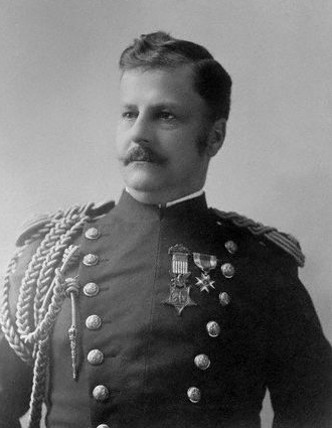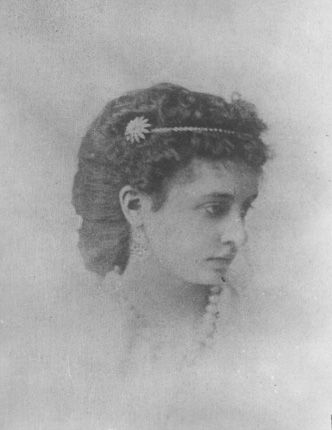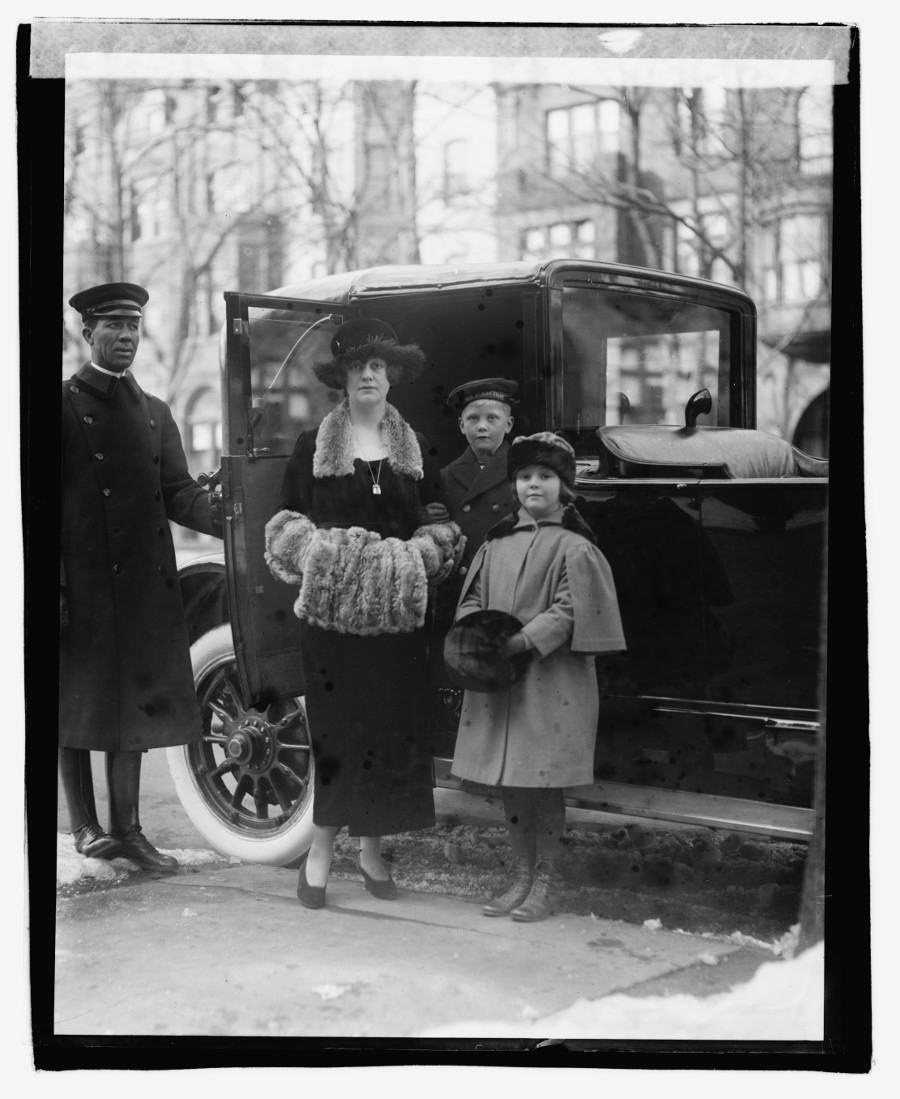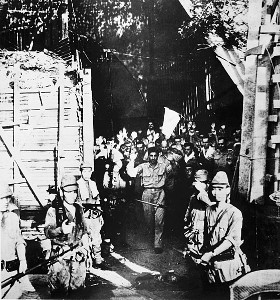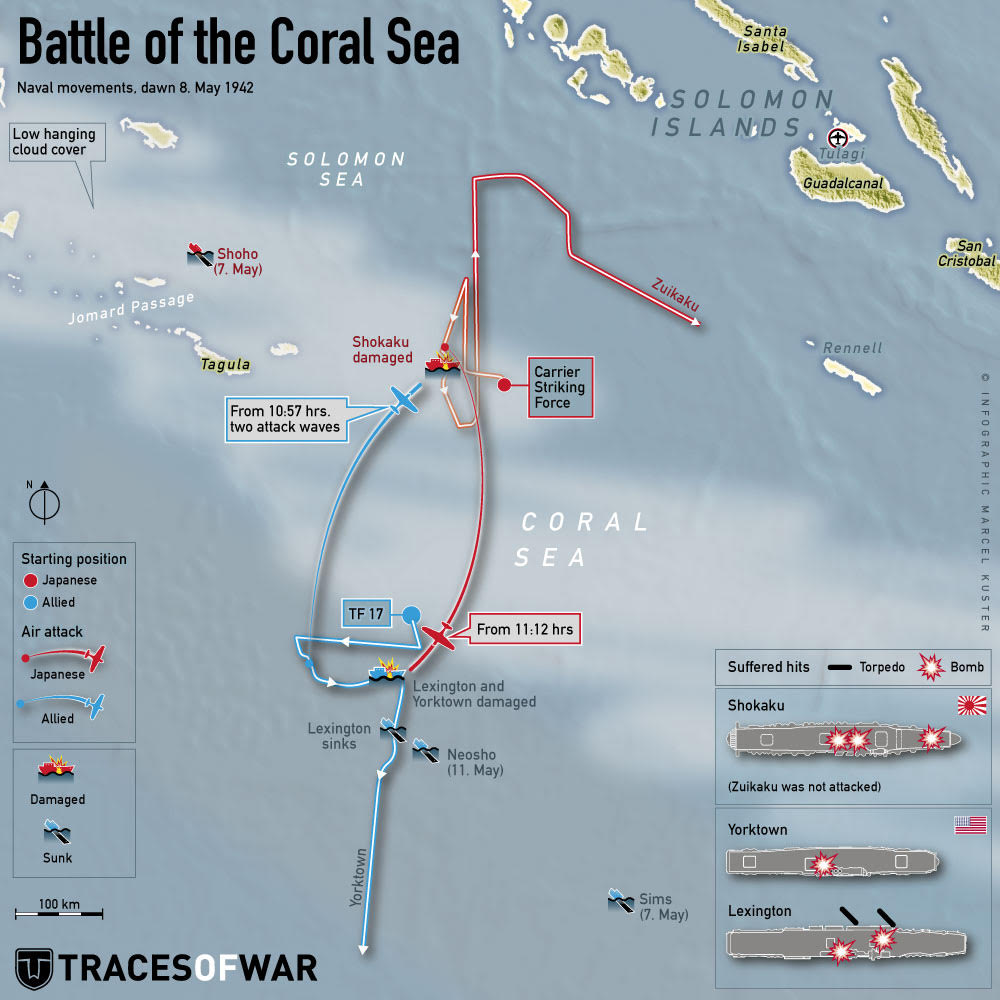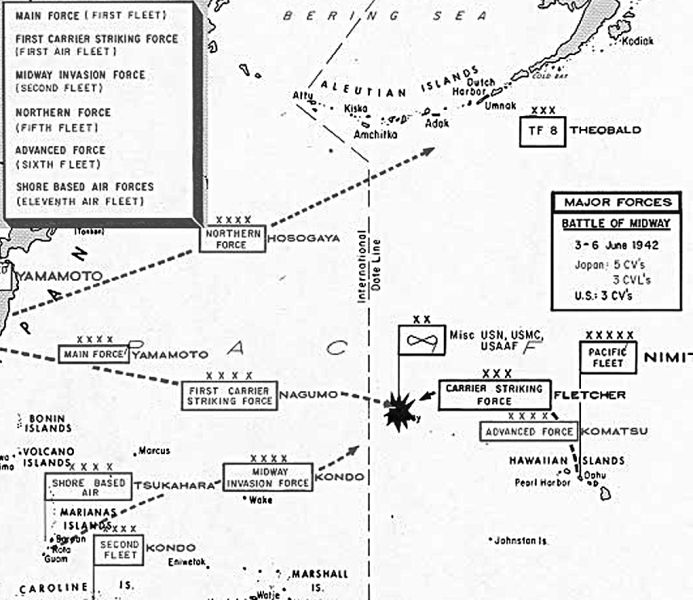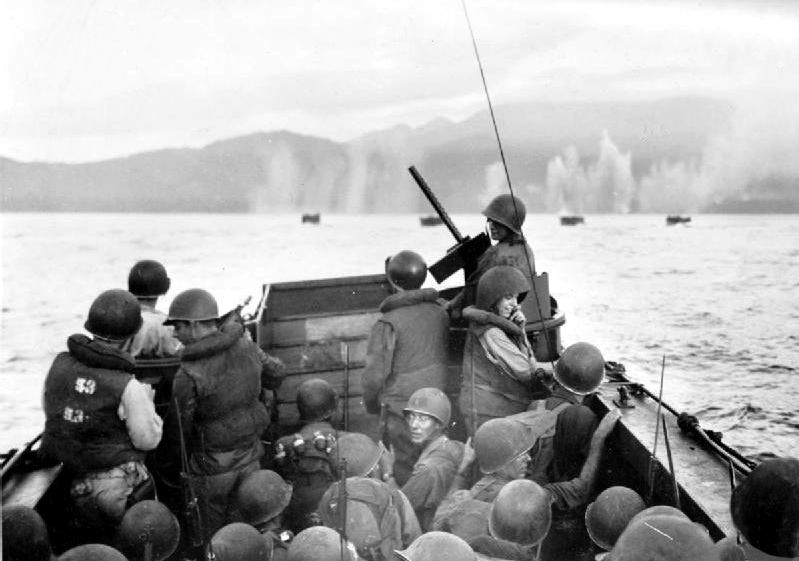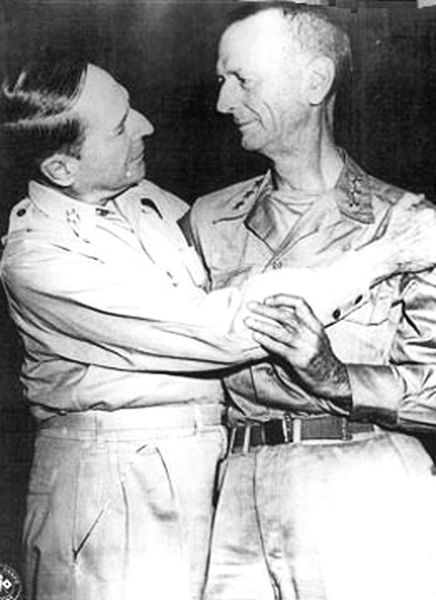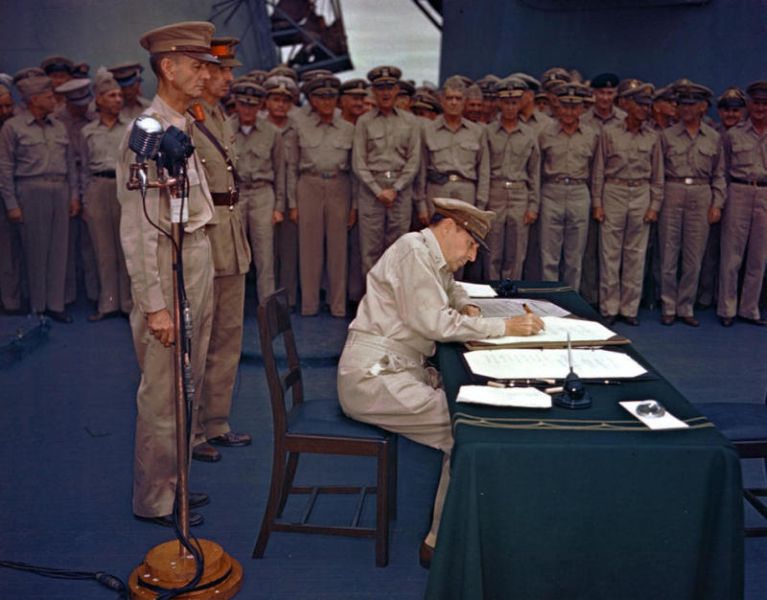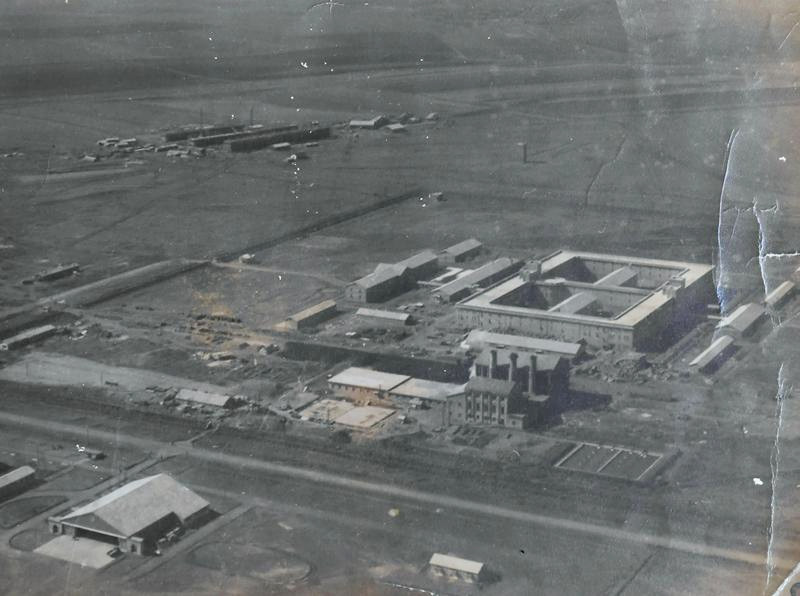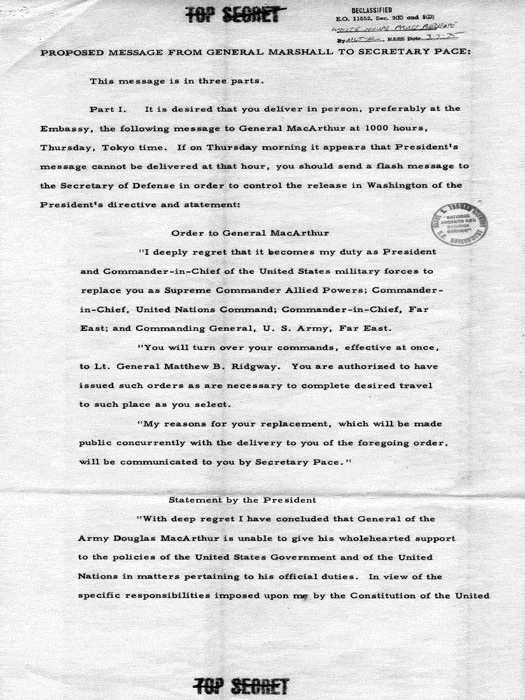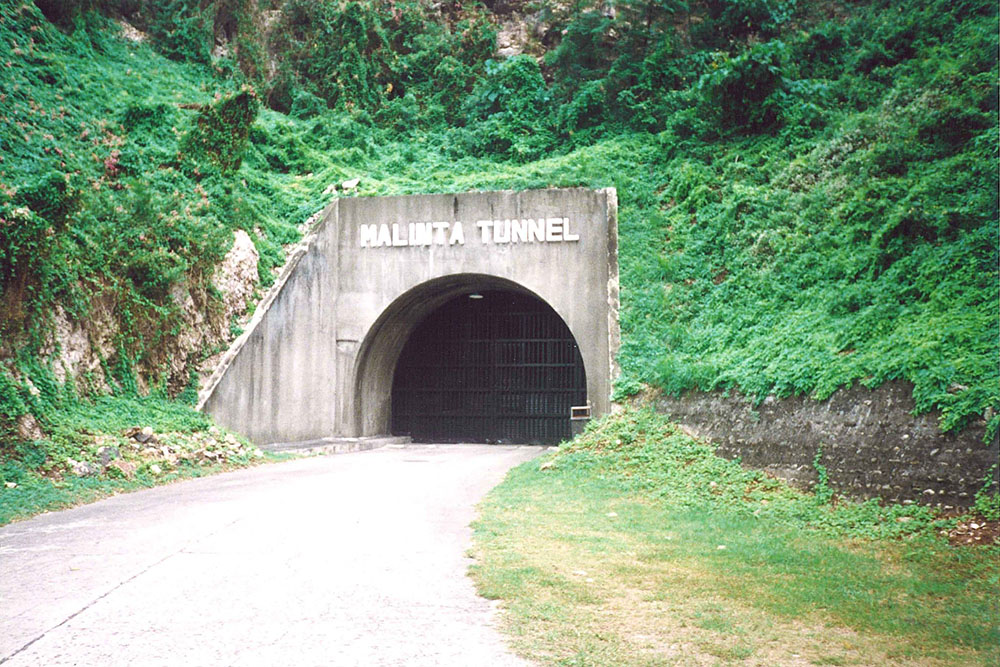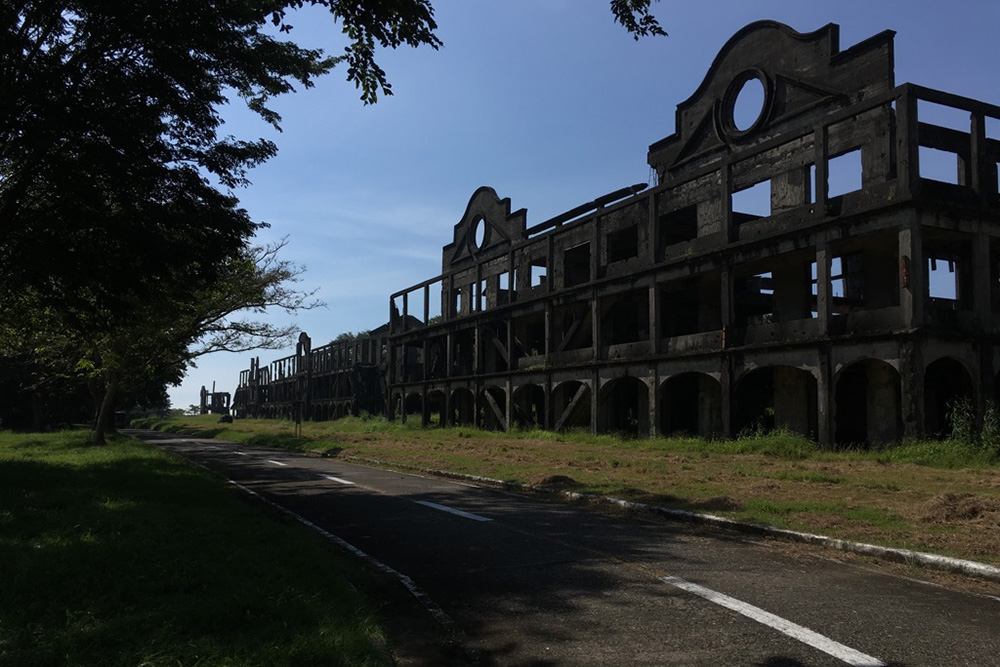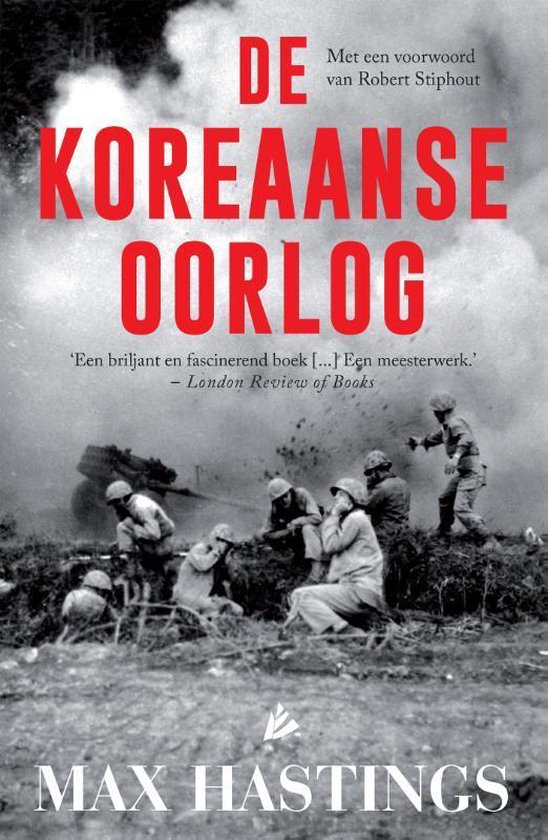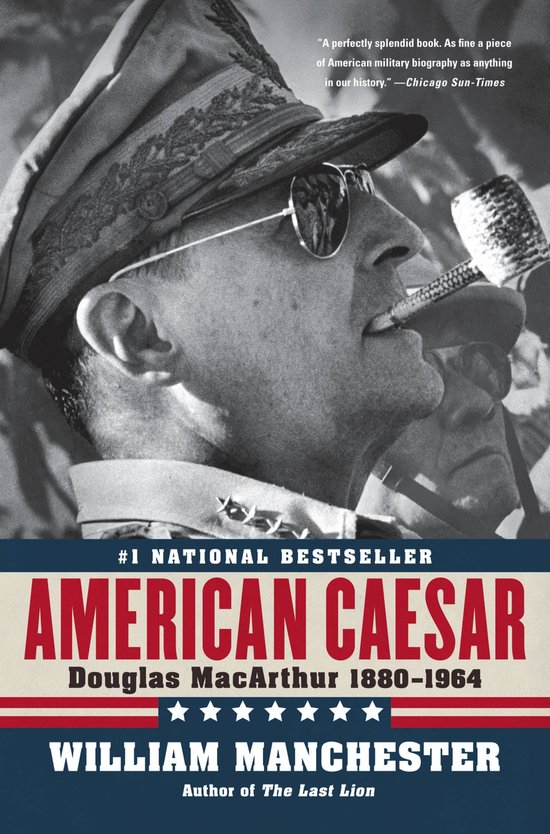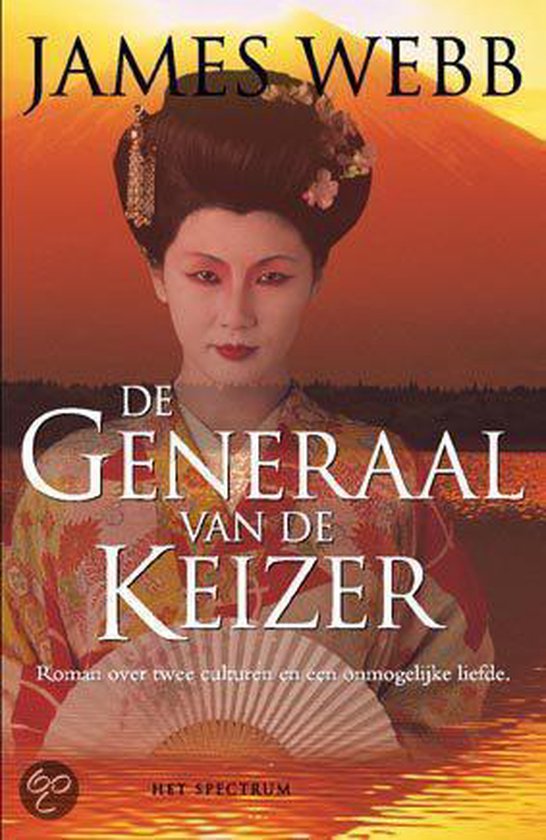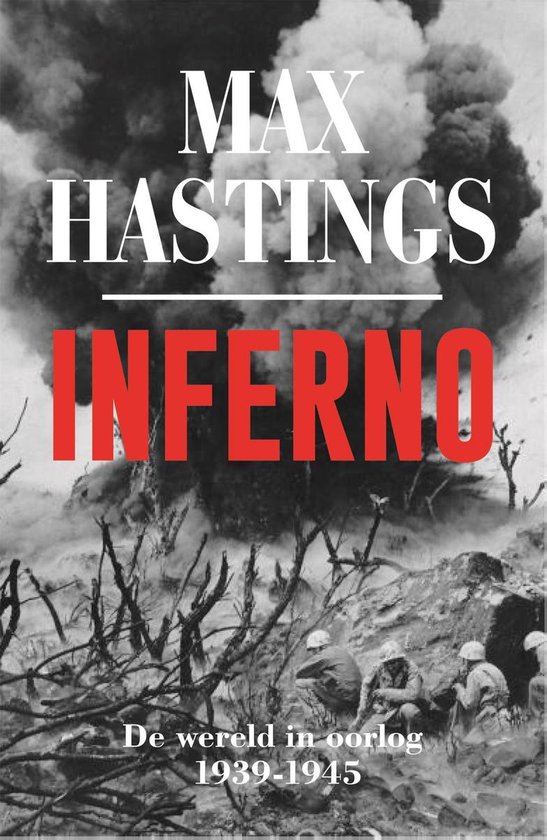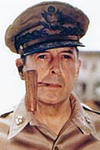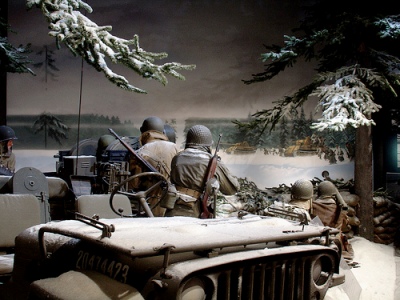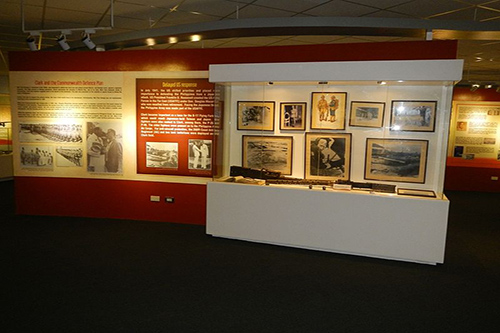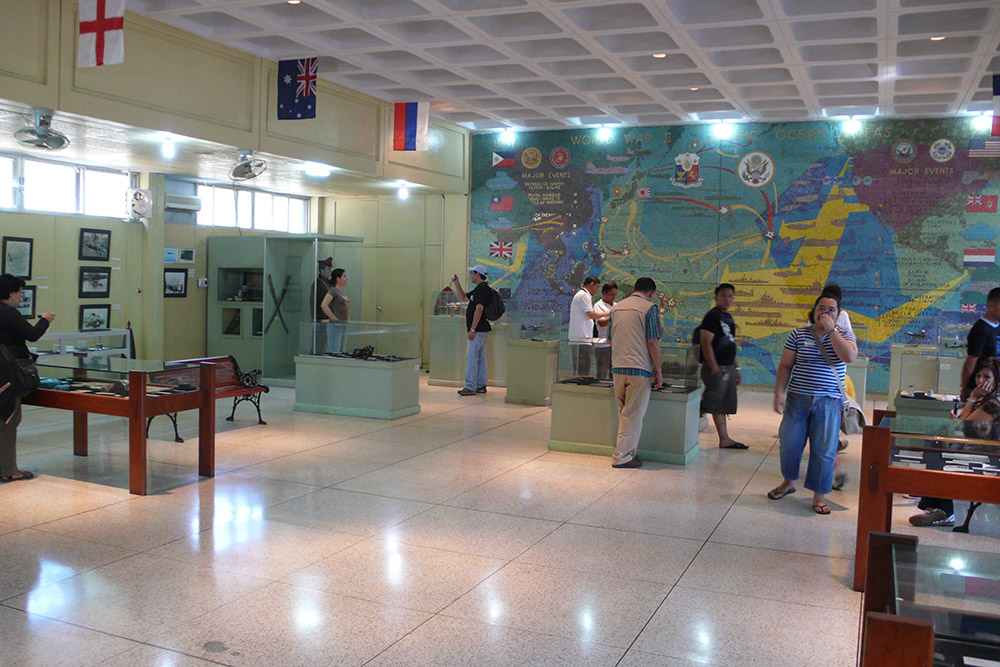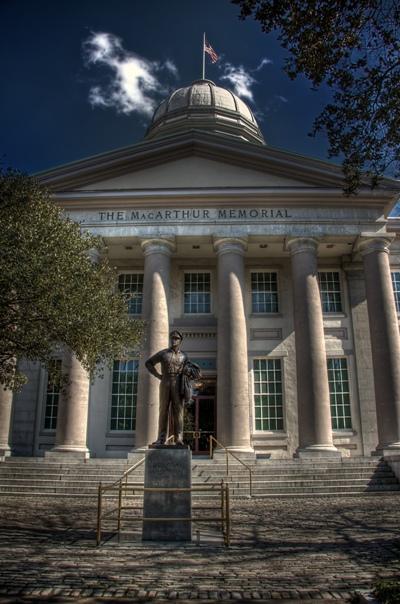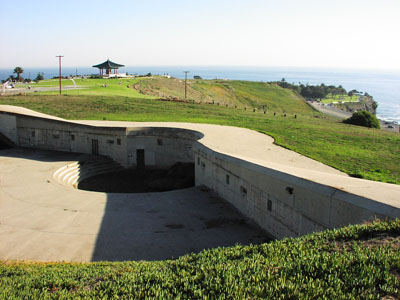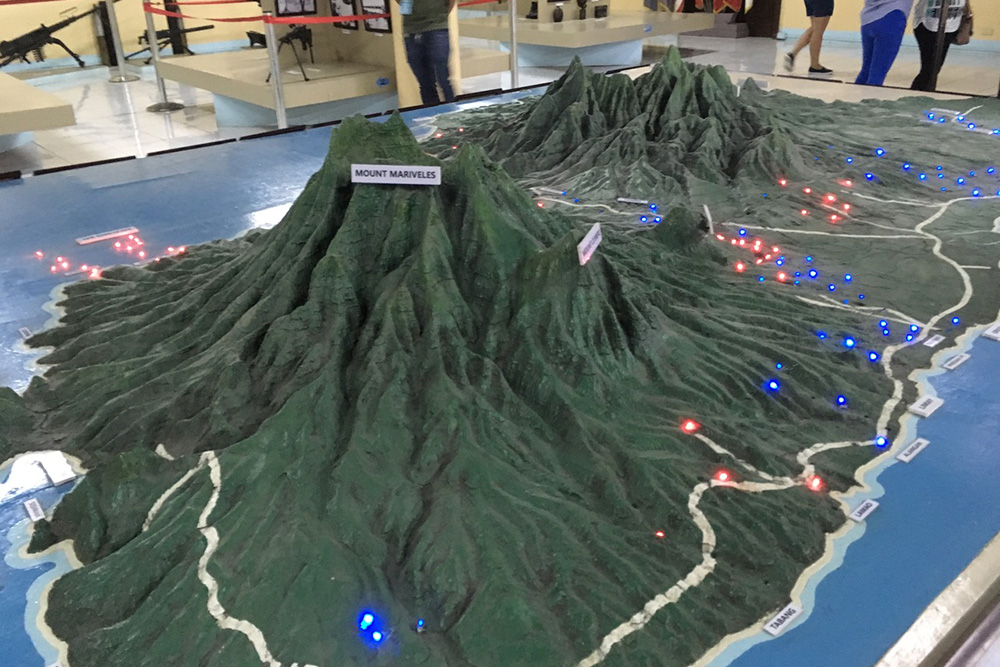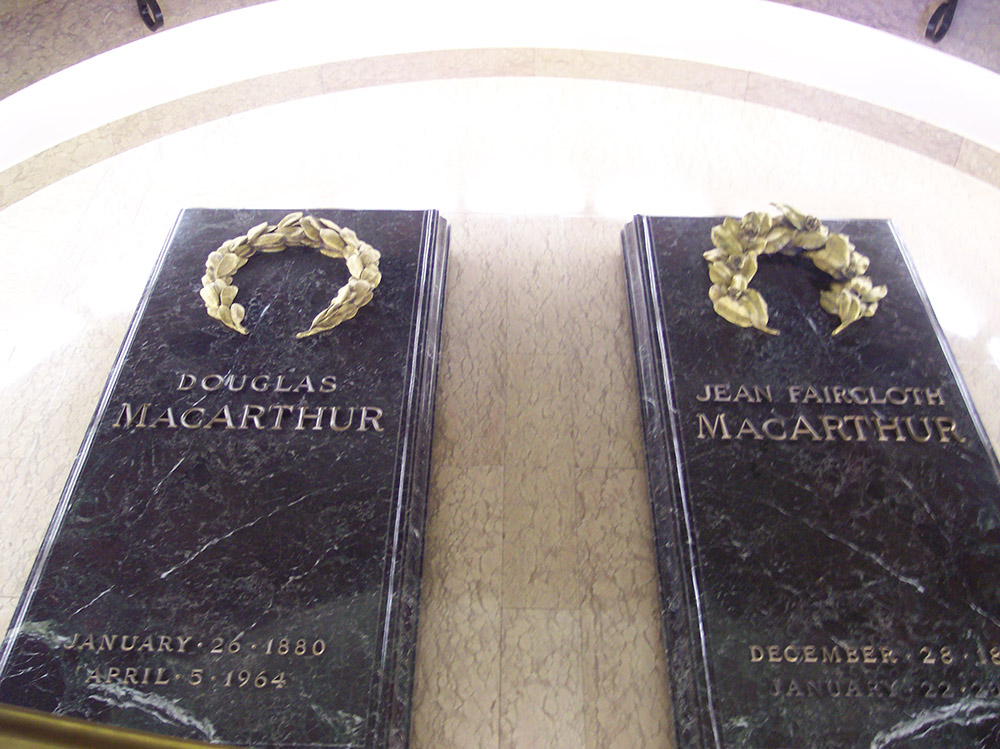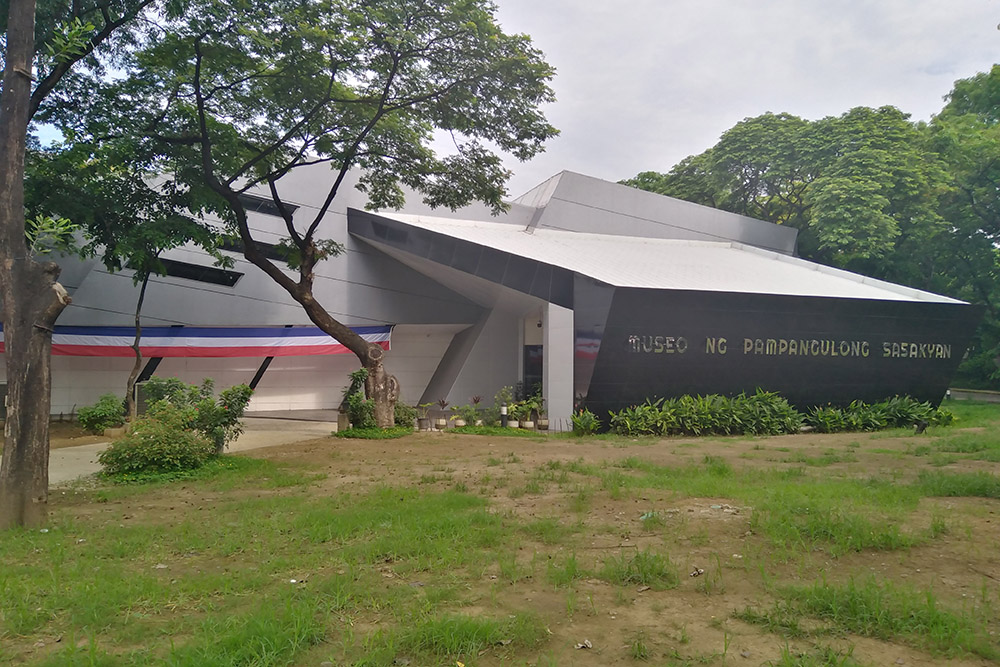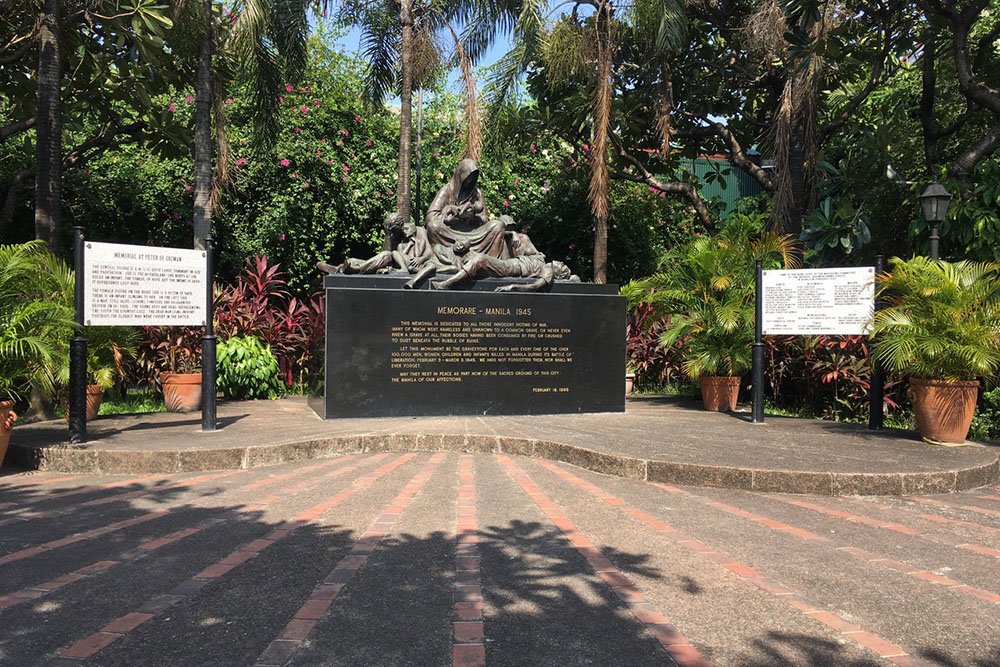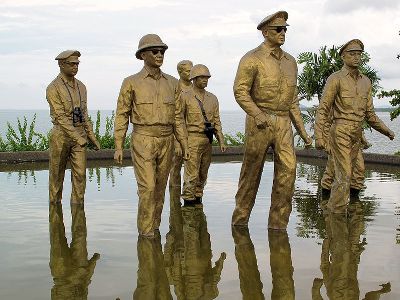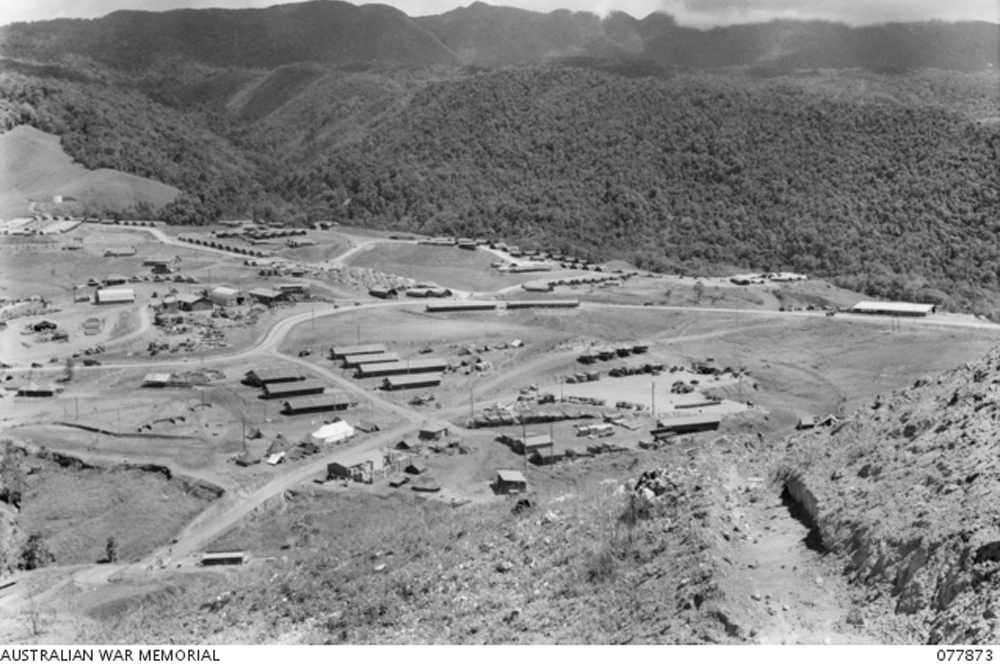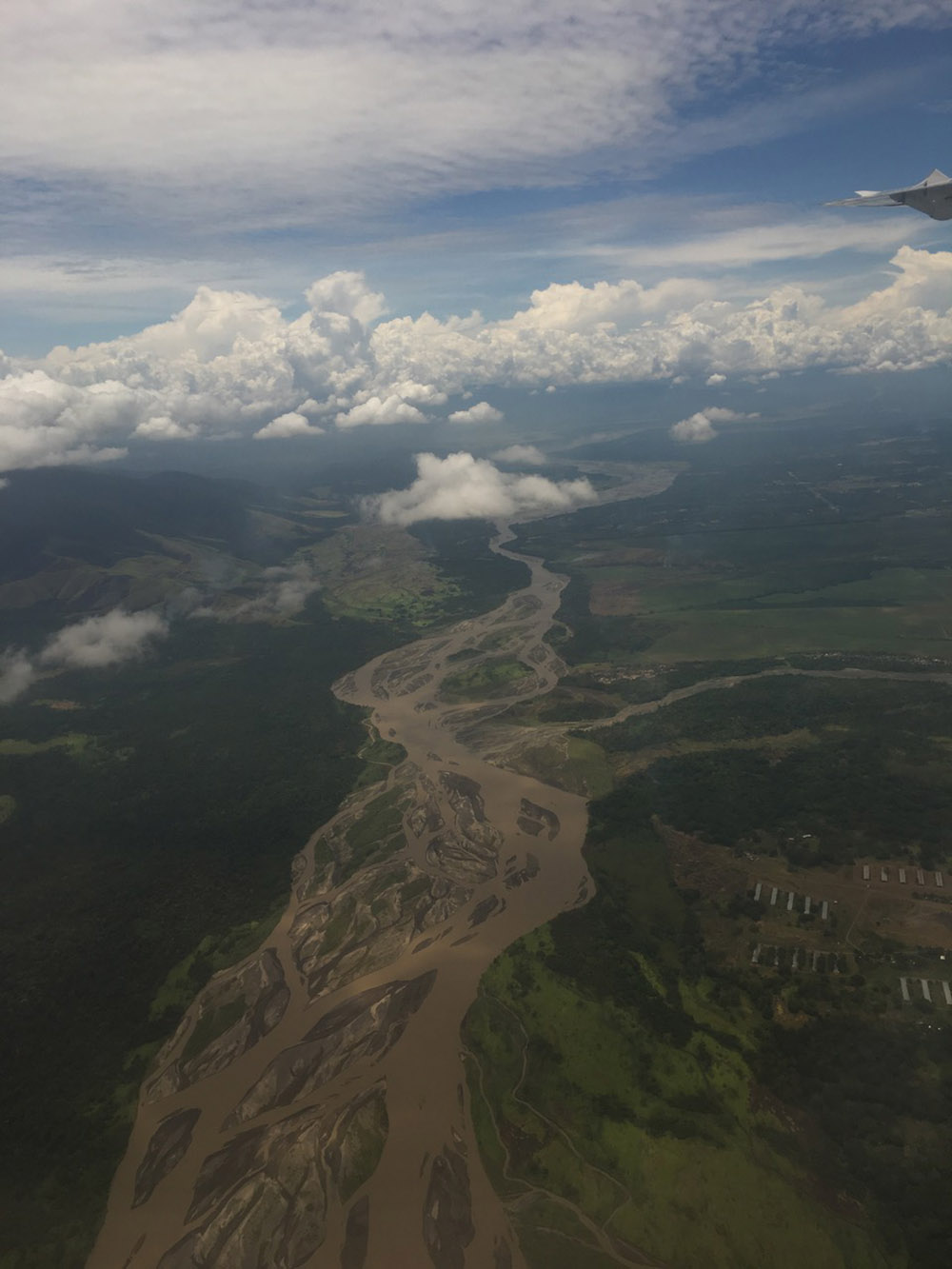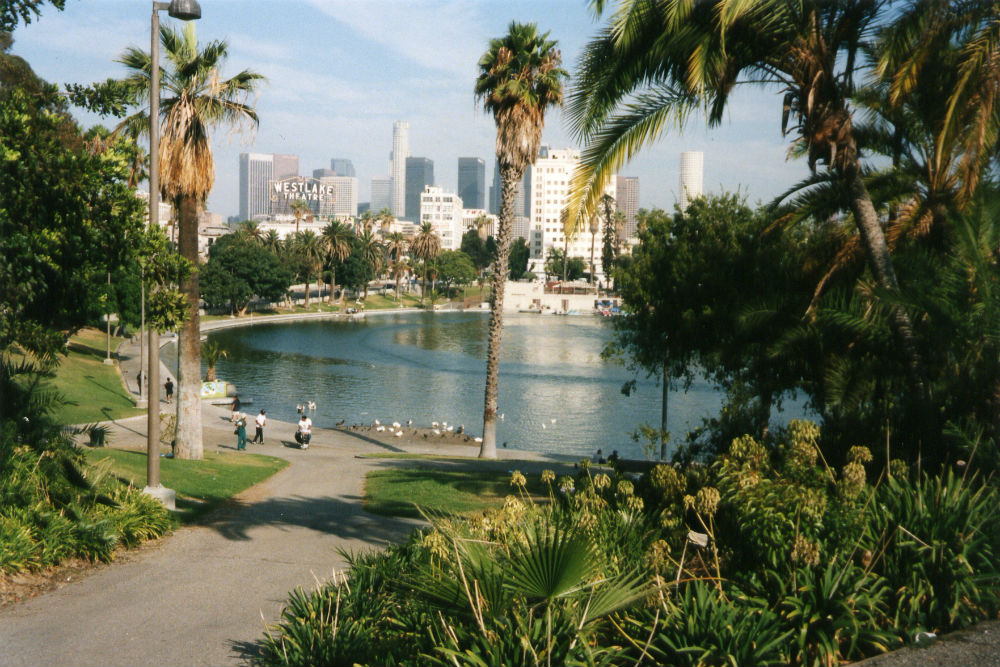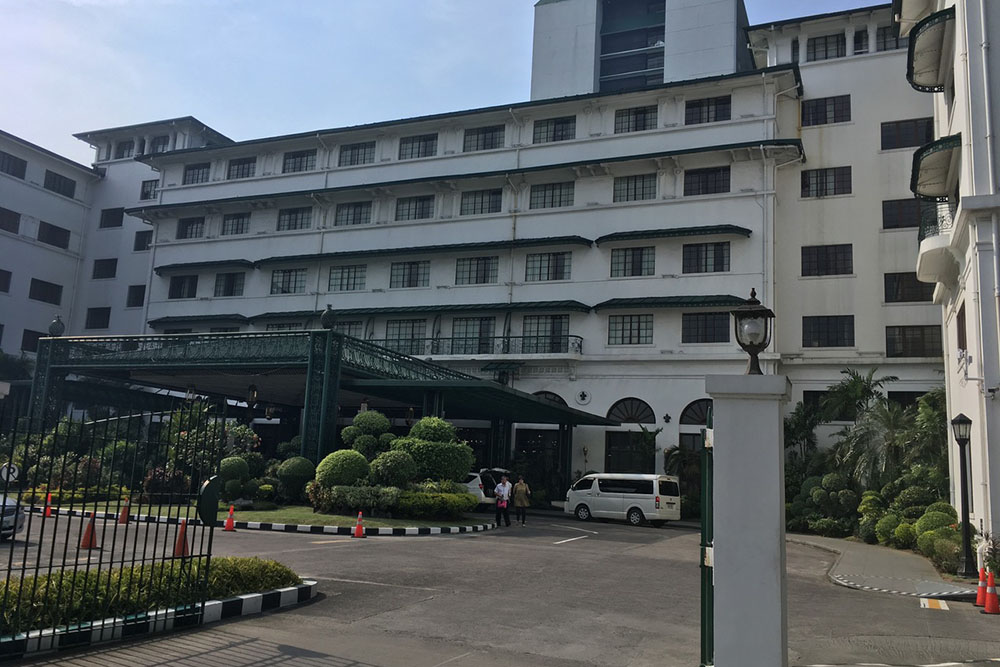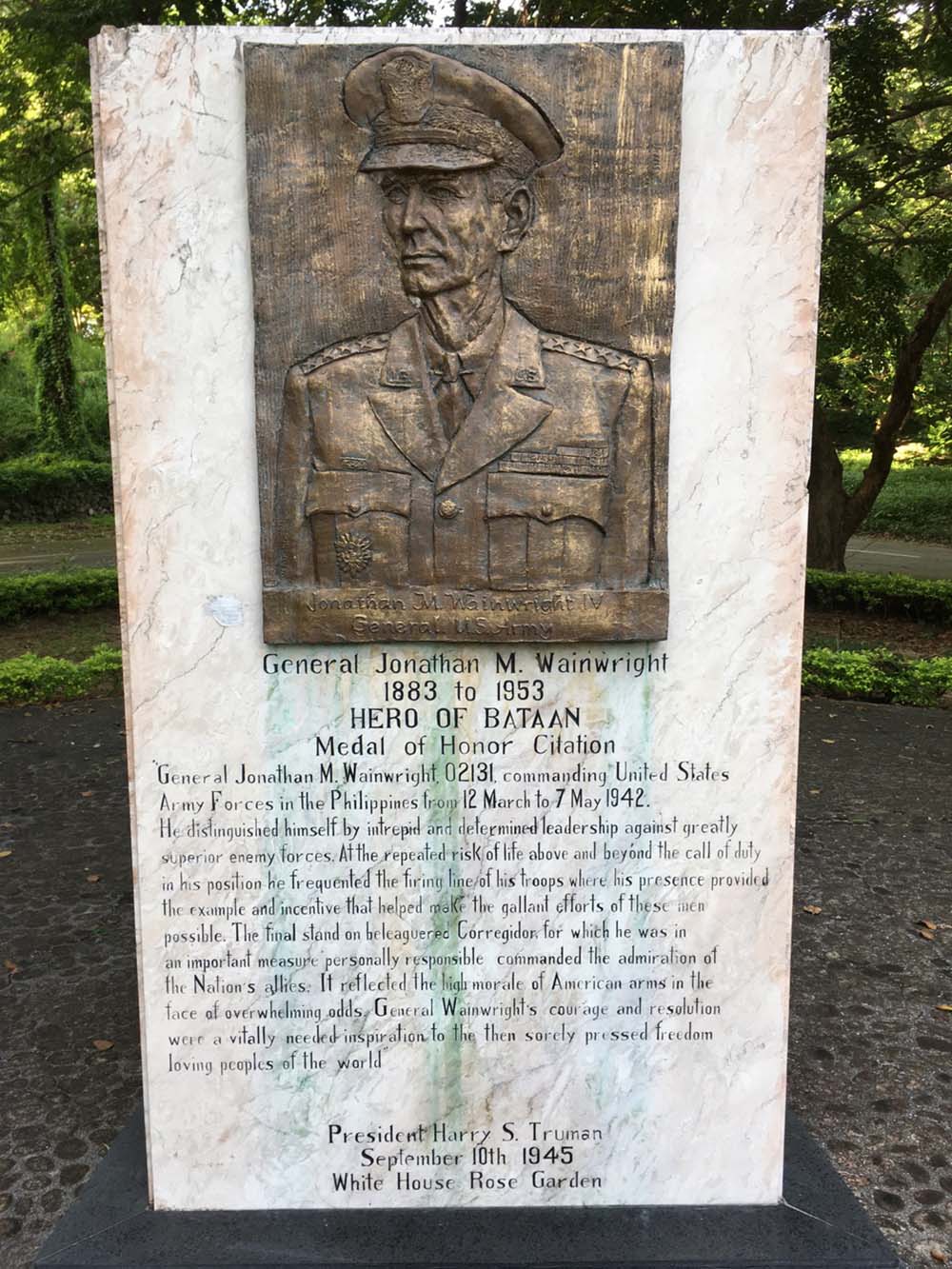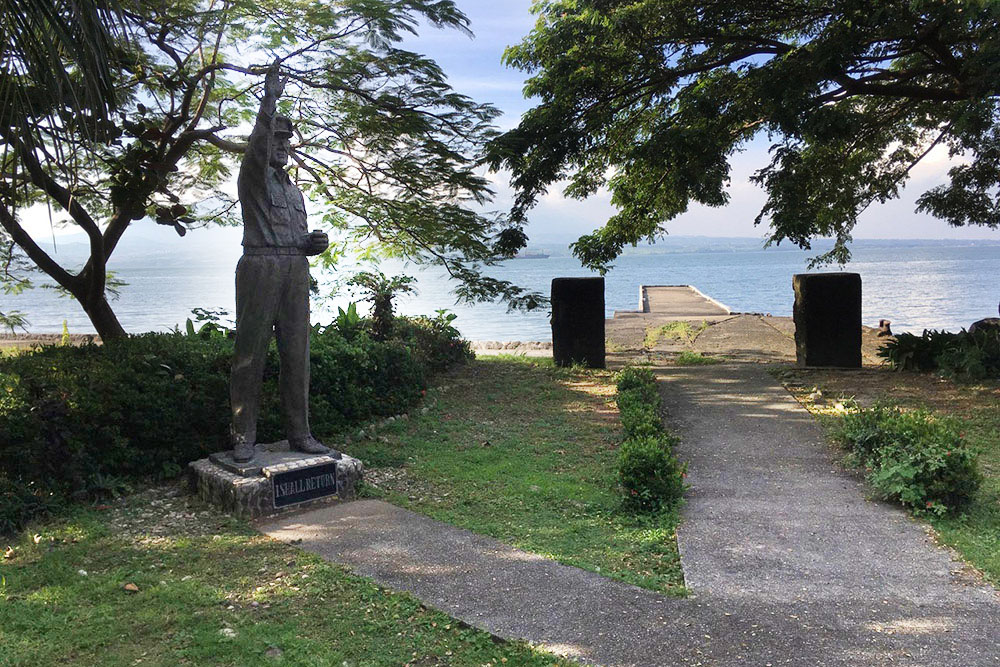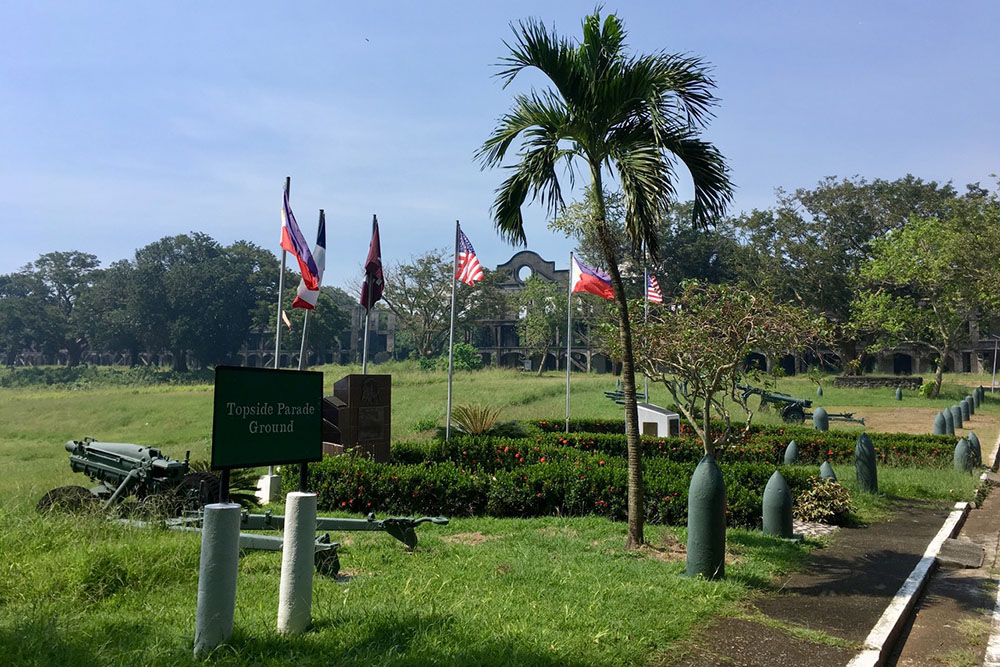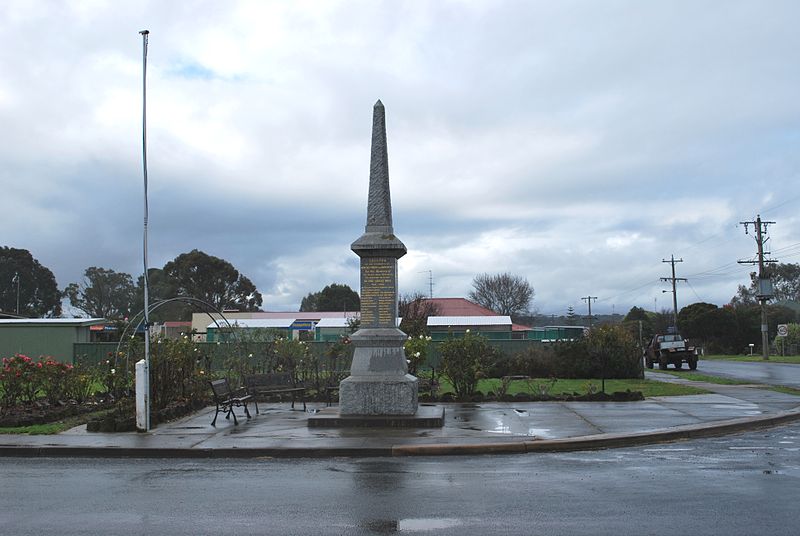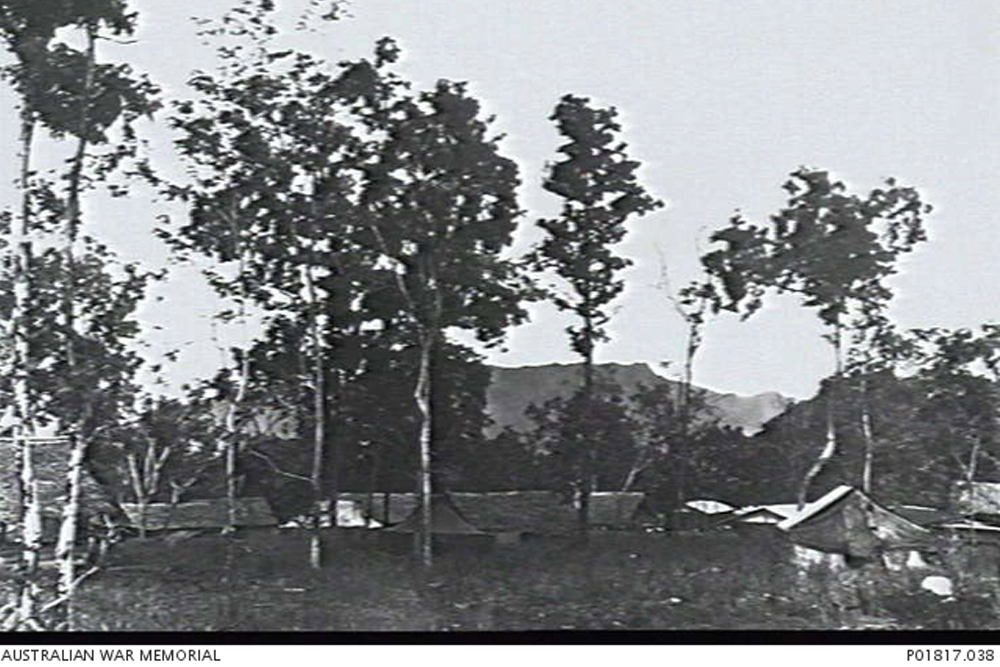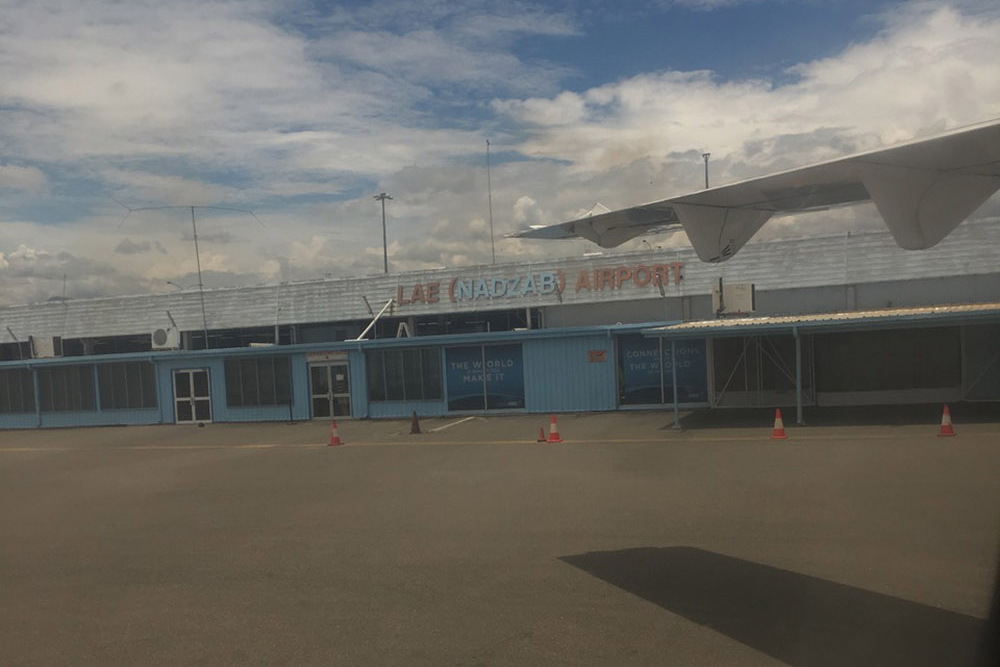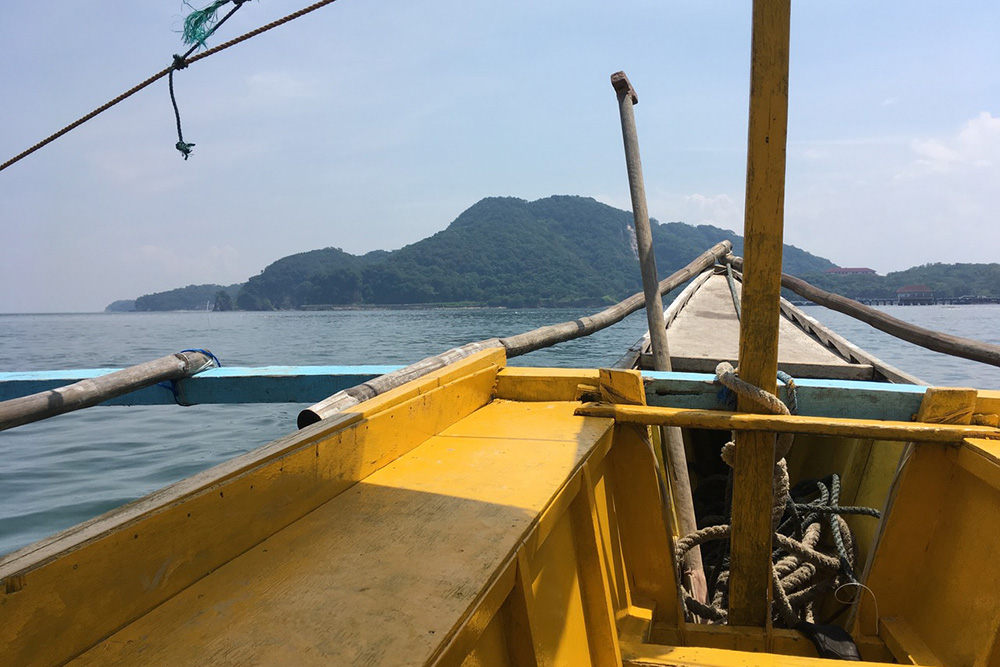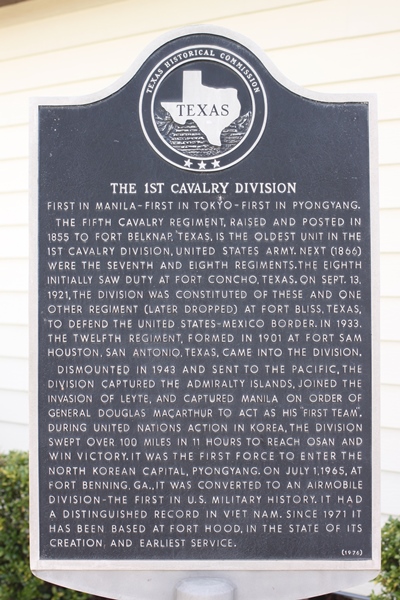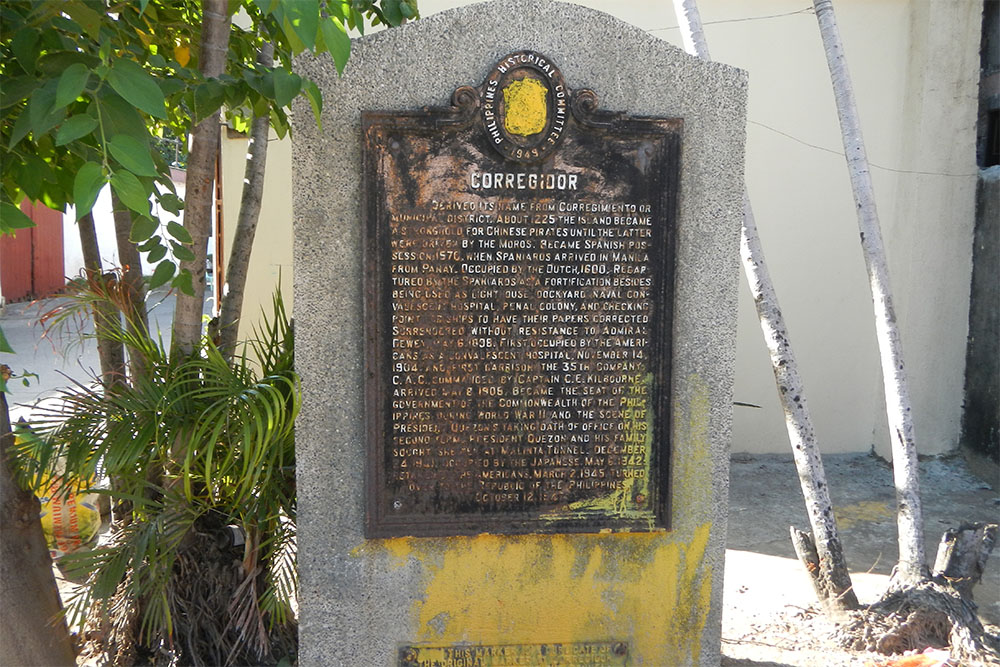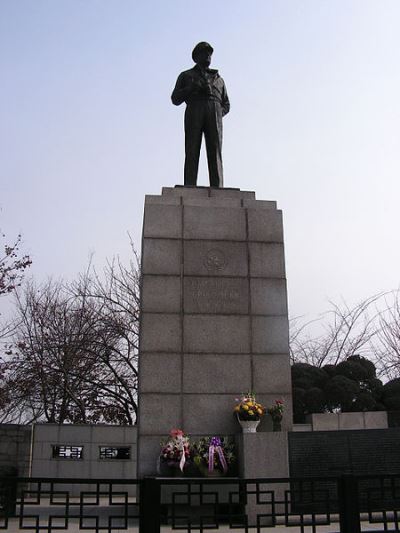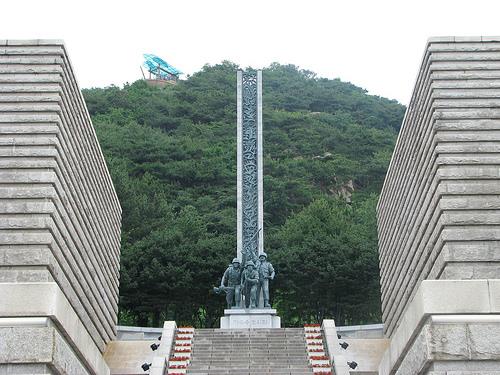Introduction
Few American commanders evoke so much controversy as Douglas MacArthur. One person calls him ‘the greatest general of all time’, another ‘one of the most dangerous men of America’. Who was he, who was called 'Dugout Doug' for his alleged cowardice one moment and called crazy the next for his hazardous actions. One would offer him supreme commander of the army, the other wanted to have him sentenced by a judge.
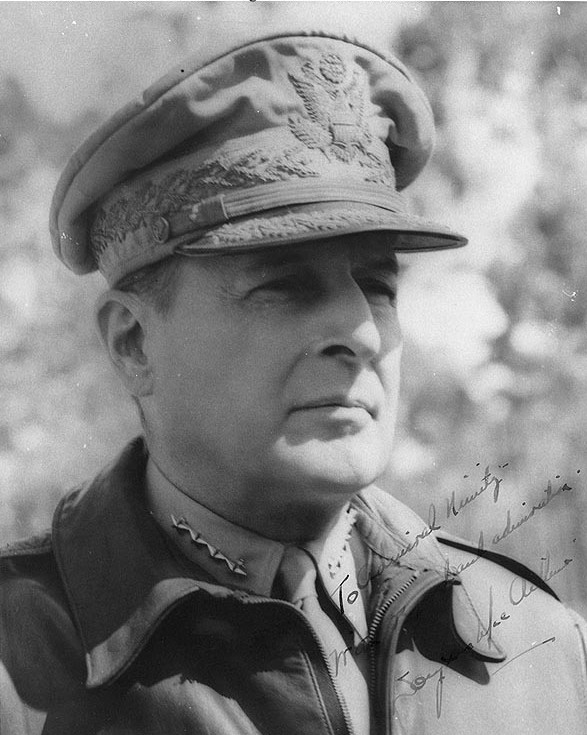
Douglas MacArthur in 1943/1944 – the caption reads: To Admiral Nimitz. With respect and admiration. Douglas MacArthur. Source: History Navy
Youth
Douglas MacArthur was born January 26, 1880 in Littlerock, Arkansas, the youngest son of Arthur MacArthur jr. and Mary Pinky Hardy MacArthur nicknamed Pinky. Douglas had two elder brothers. Malcolm however died at a tender age and Arthur would not grow old either.
The MacArthur family sprang from an age old Scottish-American stock with a rich military tradition. It was known that far-away predecessors had participated in the Crusades. Young Douglas grew up in a military environment. His father was a professional soldier who had been decorated with the Medal of Honor for his actions in the Battle of Missionary Ridge during the American Civil War. Owing to the many postings on various army bases in the west of America, the family relocated frequently. During Douglas' upbringing, strong emphasis was put on sense of duty, patriotism and military capacities. In his own words, he learned horseback riding and shooting before he could read and write.
From an early age, Douglas intended to emulate his father and, if possible, to surpass him. Early on, he displayed the high self-esteem which would make him so famous and notorious later. When a girl asked Douglas whether he was a son of General MacArthur he answered: Sure, General MacArthur can be rightly proud of it.
In order to start a prosperous career, it was essential he should study at the prestigious military academy of West Point. It turned out though, it wasn't easy to enroll. Despite support by his grandfather, Judge MacArthur sr. and various senators and governors, he succeeded in being admitted to the academy after various attempts. Medical examination caused trouble as well because of his back problems. His mother therefore had the record edited and in May 1898 he passed an entrance exam. He commenced his studies in 1899. His mother went with him. She moved into a hotel room with a view of the campus. The mother-son relationship between Pinky and Douglas – strong as it already was – grew stronger after the demise of Malcolm and remained a constant factor in his life. According to many, his mother was the only one who knew him really well.
The academy was known for the rigid discipline imposed on the cadets. The initiation rituals the freshmen were to endure were notorious. After one of his fellow cadets had died from tbc he had contracted from the rituals, the American Congress started an investigation into these methods. In this context, MacArthur was subpoenaed to testify in court. He was asked to name the names of the older cadets who had abused him. He refused to do so though.
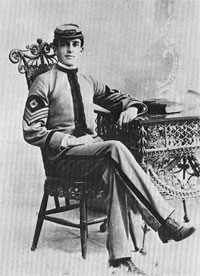
Sergeant 1 Douglas MacArthur in 1897, wearing the uniform of the Texas Military Institute. Source: Wikipedia
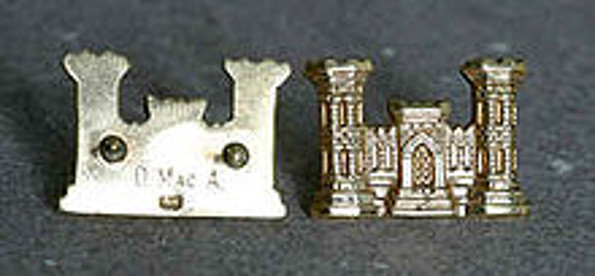
As cadet and freshly appointed 2nd Lieutenant at West Point, Douglas received this golden insignia from his family, after his graduation as Military Enigineer. In 1945, he passed it on to his own Chief Engineer Major-General Leif J. Sverdrup. Source: Wikipedia
MacArthur studied diligently. In the three years that followed, he ended as first of his class each year. He was a member of the academy basketball team. He would eventually graduate on June 11, 1903 as the first of his class with one of the highest scores a cadet had ever reached. Hereafter he was posted to the Engineers in the rank of 2nd lieutenant.
While MacArthur was studying at West Point, his father, in the rank of Major-General, commanded an army group in the Philippines. The Spanish, the colonial rulers, had reigned over this group of islands for ages. During the Spanish-American War, the territory was transferred to the United States. This however was against the will of the Philippine rebels who had been fighting Spanish rule for years and were now continuing the fight against the American rulers. This would lead to a conflict which would last three years, claiming millions of dead.
After completing his training, young MacArthur left for the Philippines. In October 1903, he was posted to the Engineers in Iloilo as an officer. During a reconnaissance patrol in the jungle, he was attacked by two guerilla fighters. About this he said later: Just like all other inhabitants of the front region, I was skilled with a pistol. I shot them both straight away.[1]
After a year in the Philippines, he served in California for a while and subsequently traveled to Japan, serving as an adjutant to his father. Here, General MacArthur was to draft a report about the Russian-Japanese war that had just ended. Thereafter, the two soldiers traveled through South-east Asia together. They visited British and the Dutch Indies, Hong Kong and Singapore, among other places. Douglas considered this period as one of the most important molding experiences of his life. In his opinion, it was crystal clear that the future and the existence of America was inexorably connected to Asia. The young officer thought nothing of the European continent.
In 1908, MacArthur completed his training at the school of Engineers. He was posted to Fort Leavenworth where he was put in command of a unit for the first time: Company K, 3rd Engineer Battalion. He also served in the White House for a while as adjutant to President Theodore Roosevelt.
On September 5, 1912, the old general died during a reunion of his regiment from the American Civil War. His son served in Panama at the time. He applied for a transfer to Washington however in order to be closer to his mother who was severely shocked by the demise and had to stay in the American capital for medical treatment. His request was granted and he was appointed adjutant to the chief of staff. In this function, he would gain valuable experience in organization.
In May 1914, on behalf of the chief of staff, MacArthur participated in the American expedition to Veracruz as observer, fighting Mexican rebels. During a reconnaissance mission behind enemy lines, he managed to highjack three locomotives. In a hail of bullets, he drove them to American territory. This earned him a recommendation for the Medal of Honor. In the end, the nomination was rejected though as he, with his bold action, had disobeyed an order from higher up. MacArthur continued serving in the War Department and on December 11, 1915, he was promoted to Major. In 1916, he was put in charge of the Bureau of Information.

American soldiers called Jackies on a locomotive during the occupation of Veracruz in 1914. Source: George Grantham Bain Collection
Definitielijst
- Medal of Honor
- United States of America’s highest military honour. Awarded for awarded for personal acts of valor above and beyond the call of duty.
- regiment
- Part of a division. A division divided into a number of regiments. In the army traditionally the name of the major organised unit of one type of weapon.
First World War
MacArthur gained more military experience during his posting in Europe during the First World War. In October 17, 1917, meanwhile promoted to Colonel, he left for France with the 42nd Division. In February 1918, the unit was actually deployed at the front. In his capacity as commander of a brigade, he participated in numerous large offensives. He was soon noticed for his bold actions, which would make him the most decorated officer of the conflict. More than once, he led dangerous missions in no man's land. The young officer wanted to prove himself as a courageous and skilled soldier, whatever the cost. Therefore he fought in the front line and did neither wear a helmet nor a gas mask. Partly because of this, he was injured often but not seriously. For his participation in a successful combat patrol, he was awarded a Silver Star.
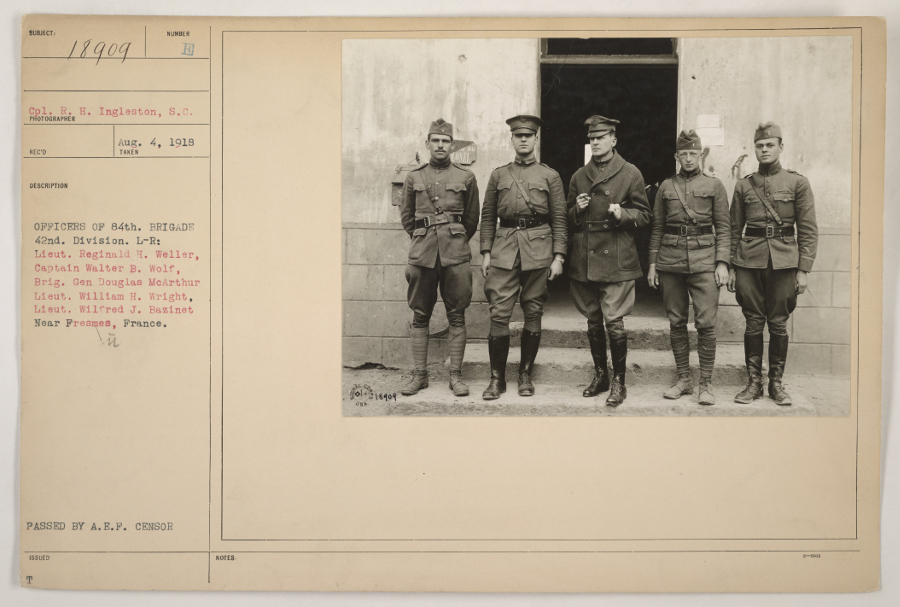
Officers of the 84th Brigade 42nd Divisie in 1918, in the center Brigadeer-General Douglas MacArthur. Source: NARA
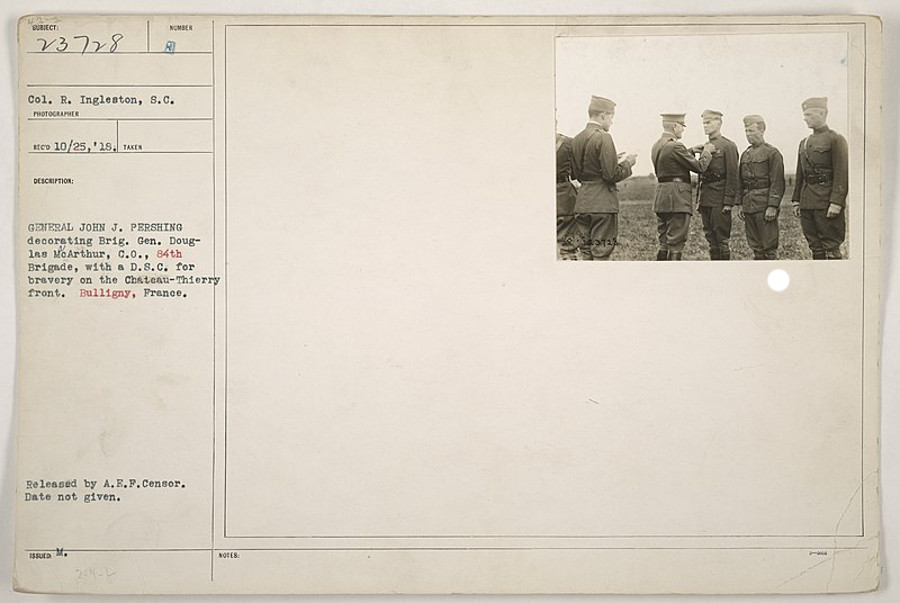
Douglas MacArthur being decorated by General John J. Pershing with the D.S.C. for bravery at the Chateau-Thierry front. Source: NARA
When he was decorated with a second DSC, he noticed this fed his vanity. On June 26, 1918, he reached the highly prized rank of general when he was promoted to Brigadier-General. Once again, he was nominated for the Medal of Honor but this wasn't supported by the American commander-in-chief John Pershing. He was charmed however by the young officer who commanded the 84th Infantry Brigade. When an official investigation was started into MacArthur's foolhardy conduct in battle, Pershing remarked: Quit that nonsense. MacArthur is the best officer we have and I intend to make him a division commander.[2] He did get this promotion on November 18, 1918, making him the youngest commander within the American army. He was not given the opportunity though to enter combat in this position as the war ended the next day. The Secretary of War, Newton Baker called MacArthur: 'the greatest American field commander the war has produced'.
Definitielijst
- brigade
- Consisted mostly of two or more regiments. Could operate independently or as part of a division. Sometimes they were part of a corps instead of a division. In theory a brigade consisted of 5,000 to 7,000 men.
- First World War
- Took place from 1914 till 1918 and is also named The Great War. The conflict started because of increased nationalism, militarism and neo-colonialism in Europe. Two alliances battled one another during the 4-year war, which after a dynamic start, resulted into static trench warfare. The belligerents were the Triple Alliance (consisting of Great-Britain, France, and Russia; later enlarged by Italy and the USA, amongst others) on the one hand and the Central Powers (consisting of Germany, Austria-Hungary, Bulgaria and the Ottoman empire) on the other hand. The war was characterized by the huge number of casualties and the use of many new weapons (flamethrowers, aircraft, poison gas, tanks). The war ended in 1918 when Germany and its allies surrendered unconditionally.
- Infantry
- Foot soldiers of a given army.
- Medal of Honor
- United States of America’s highest military honour. Awarded for awarded for personal acts of valor above and beyond the call of duty.
Interbellum
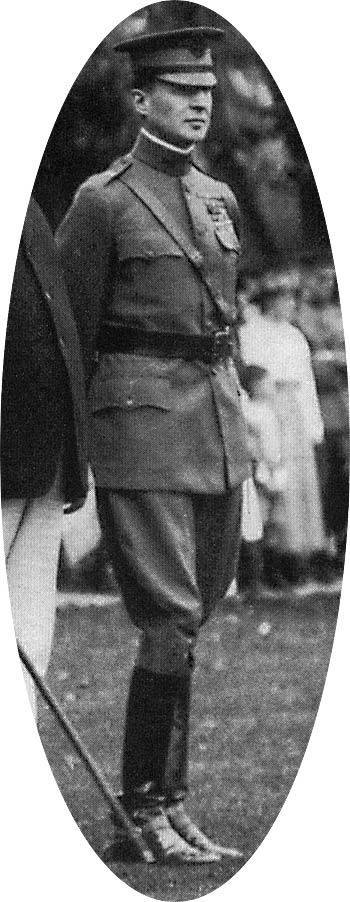
In 1919 MacArthur was appointed head of the Military Academy of West Point. Source: United States Military Academy
After the war, Mac Arthur remained in the army. After having served some time with the American occupation forces in the Rhineland, he was named head of West Point. Because of his posting, he kept his rank of Brigadeer-General, in contrast to many of his fellow officers who were degraded because of the downsizing of the armed forces. During his tenure as director, he introduced some changes aimed at letting the curriculum be more closely aligned to daily practice. MacArthur had reached the conclusion that officers needed a more widely based education in which more attention was paid to economic subjects. He increased the number of students and appointed university teachers. Up until then, cadets were mostly being lectured by officers. During his tenure, limits were also set to the notorious initiation rituals at the academy. His reforms met much resistance initially from the higher echelons of the educational staff. Later on though, they were embraced because people understood that MacArthur's modernizations were necessary.
In this period, he also came to know Louise Cromwell Brooks whom he would marry on October 14, 1922. Cromwell Brooks was a wealthy heiress with one marriage already behind her. The relationship with MacArthur ended in divorce in 1929. The fact that MacArthur had numerous mistresses was one of the reasons.
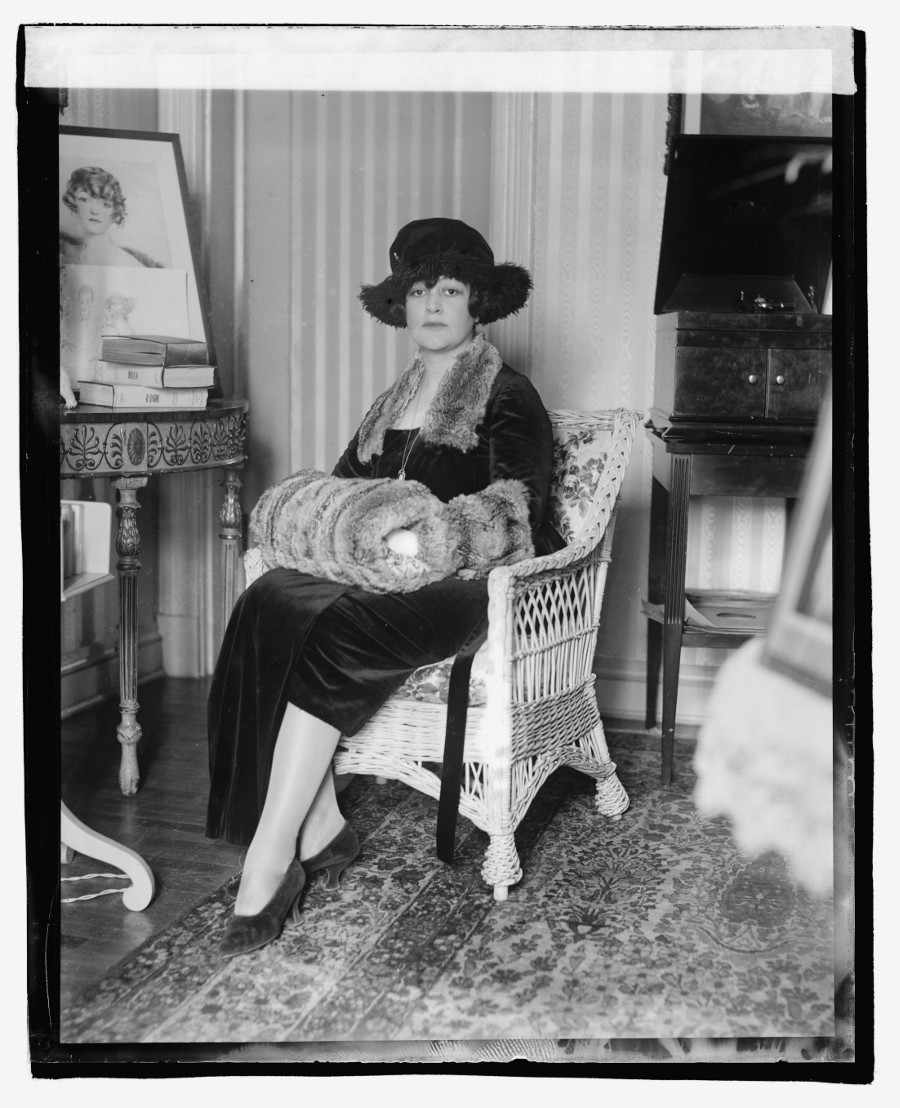
Henrietta Louise Cromwell, Douglas MacArthurs first wife. He married four times. Source: Library of Congress
After his tenure at West Point, he was transferred to the Philippines. He was appointed commander of the military district of Manilla. In this function he was tasked with drafting a defense strategy, should an enemy invasion occur. The plan he drafted entailed concentrating the defense on the island of Bataan. He paid regular visits to this inhospitable area.
In 1925 he became the youngest Major-General of the US army. A new posting brought him back to Washington where he had various commands, including over the III Corps Area.
Because of his interest in athletics, he was appointed chairman of the American Olympic Committee. He was to prepare the American delegation for the 1928 Olympic Games in Amsterdam. To this end, he was exempted from his military duties. The games were very successful for the United States. Hereafter he was posted to the Philippine Department which brought him back to Manilla.
Definitielijst
- invasion
- Armed incursion.
- resistance
- Resistance against the enemy. Often also with armed resources.
- Rhineland
- German-speaking demilitarized area on the right bank of the Rhine which was occupied by Adolf Hitler in 1936 after World War 1.
- strategy
- Art of warfare, the way in which war should be conducted in general.
Chief of staff
In November 1930, MacArthur was appointed chief of staff of the army. In his words, he didn't like this appointment as he shied away from the responsibility. He'd rather remain field commander. His mother sent him a telegram though, advising to accept the appointment after which he did change his mind.
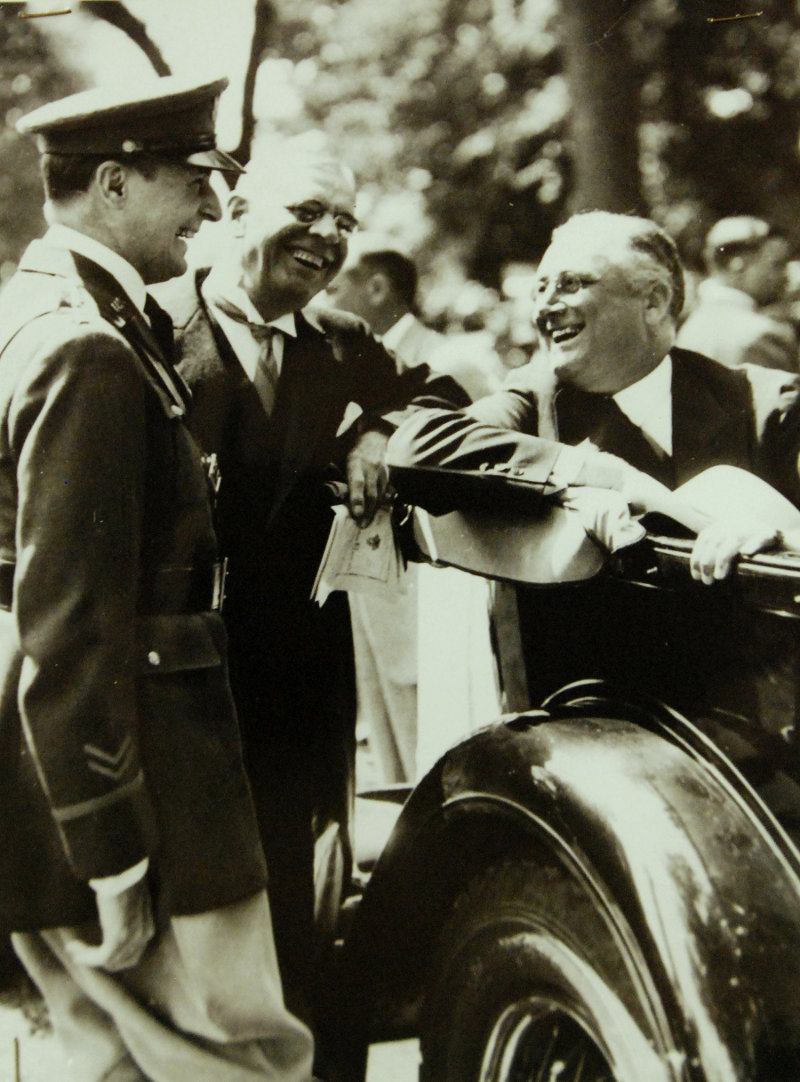
General Douglas MacArthur (left) with President Franklin D. Roosevelt after his appointment to U.S. Army Chief of Staff in 1930. Source: National Museum of the U.S. Navy
At the time, the army numbered just 125,000 men and 12,000 officers. The equipment was outdated. Due to the economic crisis, Congress intended to downsize the armed forces even more. MacArthur prevented this. He also managed to reform the military educational system and succeeded in establishing an independent air force unit.
MacArthur compromised
From May until August 1932, a peaceful protest by First World War veterans took place in Washington DC. They demanded the bonusses promised to them for their service at the front be paid by the government.
Herbert Hoover, president of the US at the time, ordered harsh action against the protesting veterans. During a confrontation between the police and the demonstrators, two persons were killed. Subsequently, Mac Arthur deployed the army to disperse the protest. On July 28, 1932, the encampment of the protestors was evacuated using tear gas and sabers. Even tanks were deployed. One demonstrator was killed in the process. MacArthur's action was widely disapproved. It blemished the reputation of the army in general and MacArthur in particular. This cruel treatment of men who had fought for their country during the First World War was labeled later as one of the most embarrassing episodes in American history. MacArthur claimed however, he had protected the nation against a gang of Communist rebels. He also stated he had only followed the orders of the Secretary of War and that no violence had been used during the evacuation. He even brought charges against two critical journalists and demanded an indemnity of $ 750,000. He dropped the charges however when it became clear to him he wouldn't win this case and also because they threatened to have a lady subpoenaed, with whom the chief of staff had an affair.
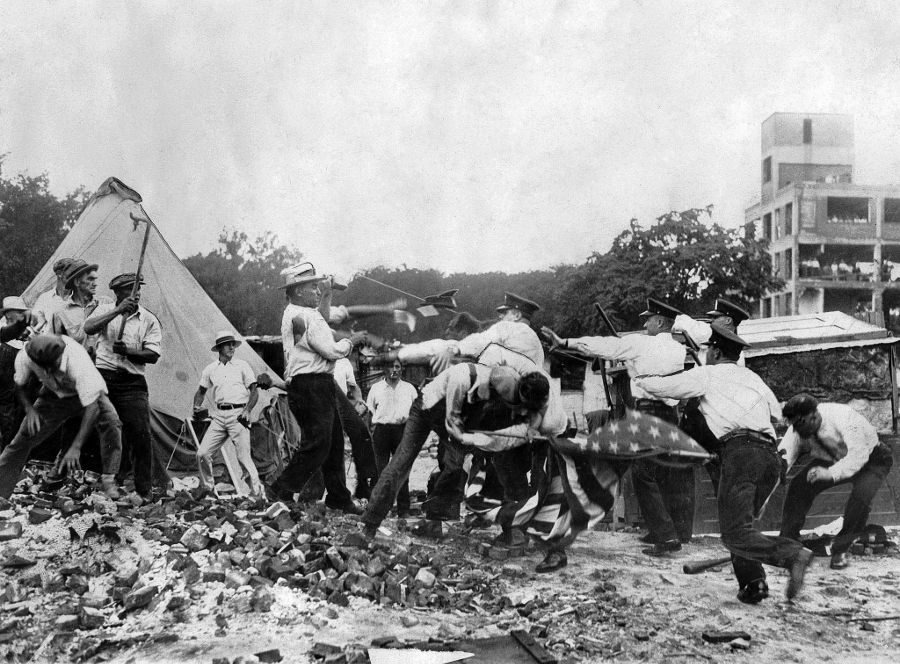
In 1932 a group of veterans from WW I and their next of kin Bonus Marchers, clash with the police. Source: NARA
In 1933, in the United States a new president was elected in the person of Franklin D. Roosevelt. The relationship between him and his chief of staff was tumultuous from the start, also because their political viewpoints were far apart. MacArthur turned against the pacifism and the isolationism of the government. They also had a heated argument about the budget of the army in 1933. On this occasion, the chief of staff offered his resignation. The President didn't accept this though. Later on, he even extended MacArthur's appointment by a year. Their relation remained precarious though. In 1935, Roosevelt declared: there are two dangerous men in America.[3] One is General Douglas MacArthur, the other is Huey Long – a populist senator from Louisiana.
Definitielijst
- First World War
- Took place from 1914 till 1918 and is also named The Great War. The conflict started because of increased nationalism, militarism and neo-colonialism in Europe. Two alliances battled one another during the 4-year war, which after a dynamic start, resulted into static trench warfare. The belligerents were the Triple Alliance (consisting of Great-Britain, France, and Russia; later enlarged by Italy and the USA, amongst others) on the one hand and the Central Powers (consisting of Germany, Austria-Hungary, Bulgaria and the Ottoman empire) on the other hand. The war was characterized by the huge number of casualties and the use of many new weapons (flamethrowers, aircraft, poison gas, tanks). The war ended in 1918 when Germany and its allies surrendered unconditionally.
- isolationism
- US policy not to interfere with foreign affairs. This policy lasted more or less until the attack on Pearl Harbor (December 1941).
Field Marshall in the Philippines
When his tenure as chief of staff had ended, MacArthur accepted the offer by Manuel Quezon, President of the Philippines and an old friend of his, to take charge (of the establishment) of its own armed forces. At the time, the American protectorate enjoyed the status of a commonwealth. This meant it was semi-independent but foreign policy and matters concerning defense were the responsibility of the United States.
MacArthur left for the Philippines together with his mother (who would pass away shortly after arrival in Manilla) and his adjutant and staff officer Dwight D. Eisenhower. Later on, the latter would rise to Allied commander-in-chief in Europe but few people expected his career would develop in such a way. MacArthur certainly didn't. He wasn't too impressed by his staff officer. Later on, Eisenhower himself declared about his time with the general: Under his direction, I have studied theatrical art. Five years in Washington and four years in the Philippines. He was impressed though by the capabilities of his superior. He had a larger-than-life intellect. My God, he was smart. He had brains.[4] Historians later declared during his time with MacArthur, Eisenhower had learned to handle people with a big ego; something very advantageous to him as CIC of the Allies in Europe during World War Two.
On August 24, 1936, MacArthur was officially appointed fieldmarshall in the Philippine army. (A year later, he officially resigned from the American army). Many, including Eisenhower, found it ridiculous that MacArthur became fieldmarshall of an army that didn't actually exist. This step was partly taken as he was angered because he was downgraded one rank, to Lieutenant-General after his resignation as chief of staff. This was normal within the American army but sensitive to status as he was, he was convinced that an exception would be made for him. The Philippine army offered him the rank of fieldmarshall which he had coveted. The generous pay that was offered will surely have played a role in this.
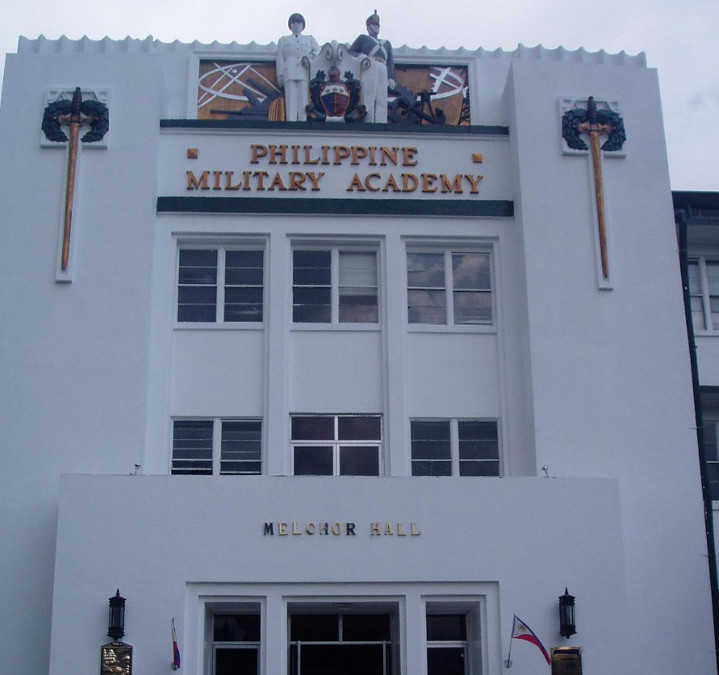
The Philippine Military Academy was established in 1936 along the lines of West Point in the United States. Source: Wikipedia
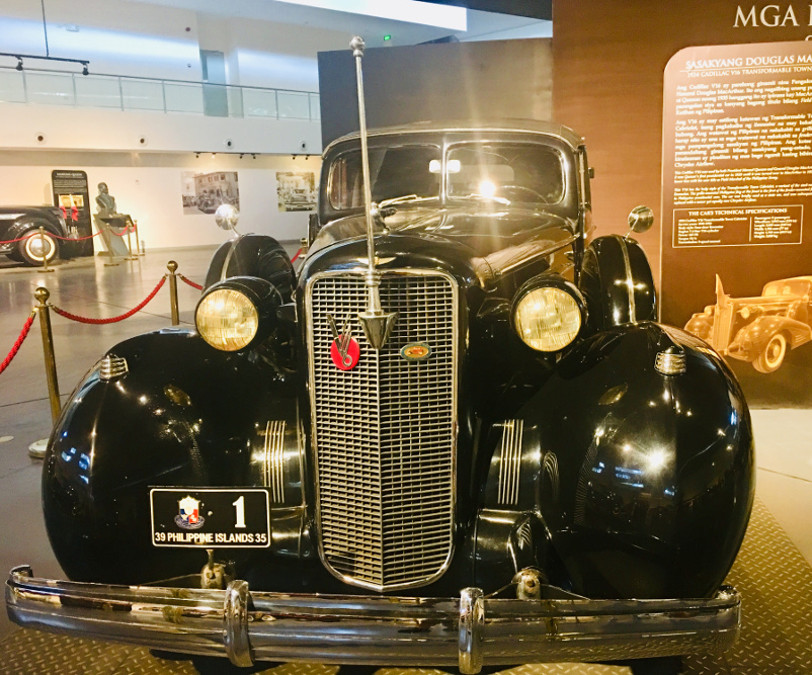
1934 Cadillac V16 Series 90 Fleetwood Transformable Town Car Cabriolet, especially built for Philippine President Manuel L. Quezon which was given to Douglas MacArthur in 1938. Source: Julan Shirwod Nueva
During this period of his career, MacArthur busied himself mainly with the social life of upper class Manilla. He did so together with his new spouse Jean Marie Faircloth whom he had married in 1937. The couple had a son, Arthur MacArthur IV born on February 21, 1938. It also was in the Philippines that MacArthur developed the habit to surround himself with a fixed group of trustees. He rather not selected them for their military capabilities but more for their loyalty and dedication. The mood around MacArthur seemed more and more like a court than a military headquarters, according to historian Sidney Mayer. One of them was his chief of staff, Richard Sutherland who had succeeded Eisenhower in 1937. According to many historians, Sutherland wasn't the right person for this function because of his arrogance and short fuse. MacArthur maintained him though.
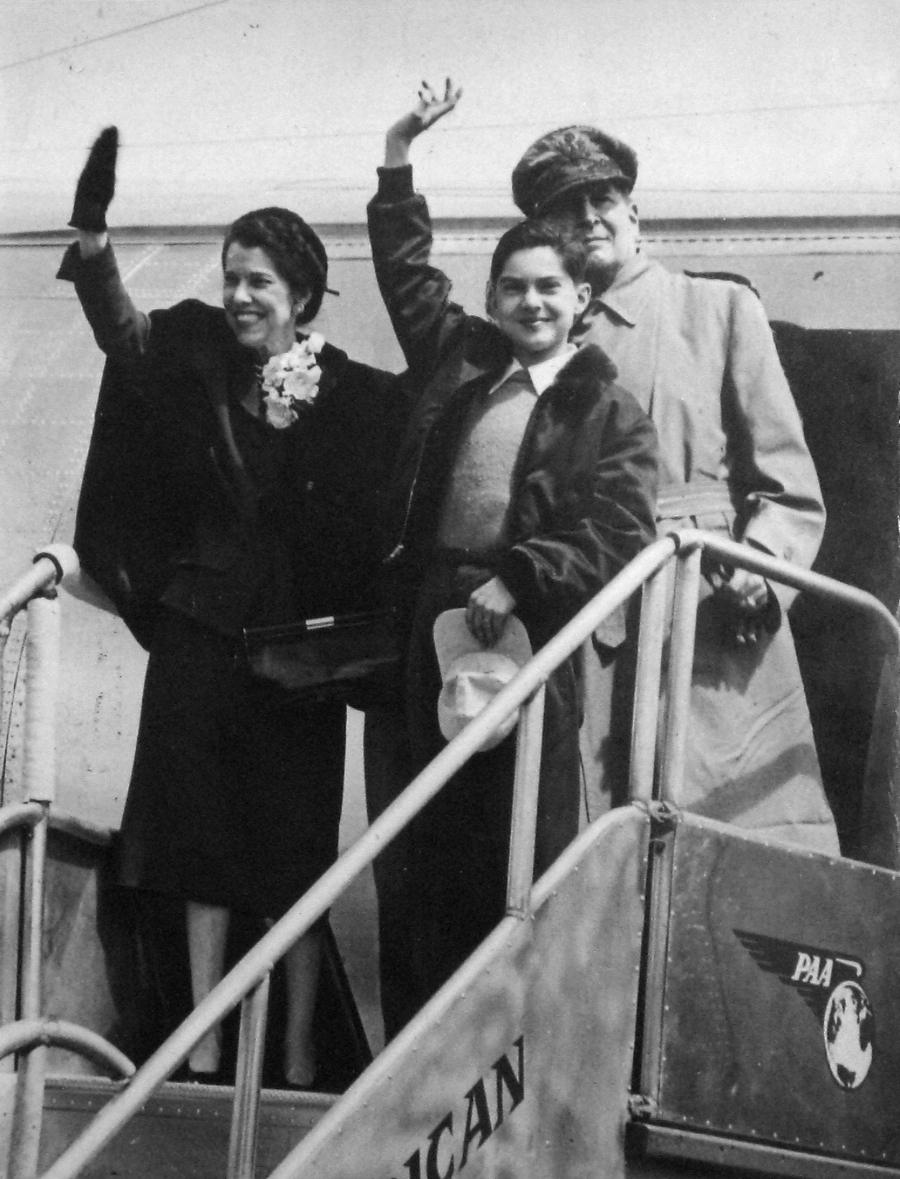
In 1937, Douglas MacArthur married Jean Marie Faircloth. Their son Arthur MacArthur IV was born in 1938. Here the family in 1950. Source: Wikipedia
The army was equipped and paid for by the American government. According to MacArthur, within 10 years an army could be established capable of defending the Philippines against an enemy invasion provided the necessary budget would be granted to him. Washington surely wasn't generous with providing financial means though and this caused severe tension with the brand-new fieldmarshall.
Due to financial problems and also because the Philippinos were not overly enthusiastic, MacArthur did not manage to establish a capable army. Training of the men was poor. Due to a shortage of indigenous officers, it was impossible to form sufficient steady cadres for the units. MacArthur's plans for defense also had some weak points. For instance, he consciously opted for not deploying capital naval vessels. He relied on MTBs and bombers to repel an invasion. Mayer called this viewpoint naïve and irresponsible. Leaving the coast without cover was a scandal, according to the historian.
Regarding the means available to him, MacArthur could do little to improve the defense of the islands. He did take it to a higher level though but it wasn't enough. According to him, the armed forced would be ready to fend off an attack as late as 1946. It soon turned out, the army wasn't granted that time.
Definitielijst
- invasion
- Armed incursion.
Mounting tensions
MacArthur was apprehensive of the rising (military) power of Japan, certainly after the country had captured French Indo China in June 1940. He asked Washington for more men and equipment. The government turned down his request though. Roosevelt took a lot of trouble to have Congress approve freeing financial resources for an expansion of the American armed forces, which were weak at the moment and its weaponry needed to be replenished. Attempts by the US were also targeted at supporting Great Britain with material pursuant to the Lend-Lease Agreement. The Philippines were at the bottom of America's list of priorities.
On July 26, 1941, MacArthur reentered active service in the US armed forces, urged on by Roosevelt. This was the outcome of the merger between the American and Philippine armed forces. MacArthur was appointed CIC of the American Army in the Far East in the rank of Major-General. He was quickly promoted to Lieutenant-General and soon after to General. For his new command, he assembled a group mainly consisting of old friends whom he trusted, like Charles Willoughby and Richard Sutherland. His staff would remain the same throughout the war and became known as the 'Bataan Gang'.
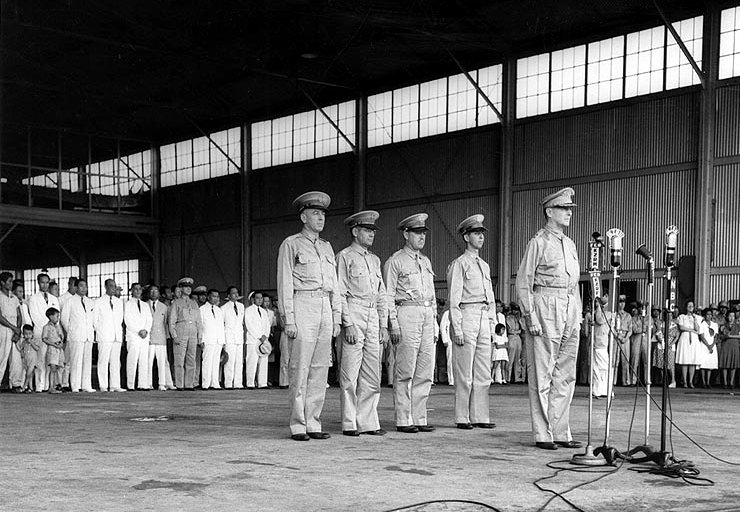
Ceremony at Camp Murphy Rizal, August 15, 1941 on occasiuon of the establishment of the Philipine Air Corps. Behind Lt. Gen. Douglas MacArthur, f.l.t.r. Lt. Col. Richard K. Sutherland, Col. Harold H. George, Lt. Col. William F. Marquat, and Maj. LeGrande A. Diller. Source: Center of Military History, United States Army
MacArthur suffered from shortages of equipment and personnel. On paper, he was in command of 130,000 men but these were mainly untrained reserve units. Only 13,000 of these were battle ready. The Philippine air force, based on Clark Field, consisted of 35 bombers and 72 fighters. At least twice as many combat aircraft were needed. The naval forces were a minority as well.
Yet it was his opinion he could defend the Philippines. On November 28,1941, he was informed by the chief of staff Lieutenant-General George Marshall that negotiations with Japan had failed and that the Empire would go into the offensive. This offensive began on December 7 with the bombing of Pearl Harbor. At that moment, it was already December 8 in the Philippines. Hereafter, MacArthur would make one of the greatest mistakes of his career.
The commander of the Far East Air Force, Major-General Lewis Brereton asked permission to launch an air attack on the island of Formosa, occupied by Japan. MacArthur refused. He was convinced the Philippines would stay out of the war. He also thought Japanese aircraft lacked the range to reach the area. Later, the general himself declared he had never received Brereton's request although available sources prove otherwise. He did allow a reconnaissance mission over Formosa though but that was as far as he wanted to go. In MacArthur's defense, it can be stated that he had received orders from Washington not to take any open action, provided the Japanese did actually attack. This means however that, regarding Japanese air traffic over the Philippines, MacArthur would have had every right to allow an attack on Formosa. Should the air attack have been carried out, the Japanese air force in the area would have been dealt a severe blow. A few hours later, on December 8 1941, exactly the opposite occurred when the Japanese bombed Clark airfield. During this attack, 18 B-17 bombers and 53 fighters were destroyed.
Definitielijst
- offensive
- Attack on a smaller or larger scale.
Combat on Bataan
Once the air force had been eliminated, the battle for the Philippines had actually ended, what happened next was, according to Mayer, no more than a 'tragic epilogue to the blunder that had been made in the beginning.
In the subsequent weeks, the Japanese carried out numerous landings on the main island of Luzon. MacArthur hoped he would receive reinforcements but Washington didn't wish to waste men and equipment on a faraway battlefield where victory couldn't be reached anyway.
In contrast to his earlier statements and strategy, MacArthur now stated (correctly) he was unable to defend all islands. He concentrated his American-Philippine forces on the isthmus of Bataan. Partly because MacArthur's proposed strategy earlier on, storing supplies of ammunition and food in time had been neglected however. After the invasion he feverishly attempted to improve the defense on the isthmus. Before the outbreak of war, he had invariably blamed those who had advocated this for defeatism.
Notwithstanding the fact that the Philippine troops were poorly trained and equipped, MacArthur assumed nonetheless they would put up a strong defense. In this he was let down. Many indigenous units fled as soon as they were confronted with their Japanese opponents. This didn't stop him though from issuing a press release in his characteristic style: My courageous divisions are holding out, denying the enemy access to the sacred soil of the Philippines. We have inflicted heavy losses on his troops and his bridgehead isn't safe anywhere. Tomorrow we will drive him back into the sea.[5] Actually, the Japanese advanced without too many problems and had little to fear from MacArthur's soldiers. One happy stroke was they concentrated on capturing the capital Manilla, enabling most American and Philippine troops to reach Bataan. The retreat, which had begun on January 1, 1942, had progressed rather well despite the inhospitable terrain and 13,000 men having dropped out; mostly deserters.
On Bataan, supplies would have been stored there to support 43,000 men for 6 months. However, over 80,000 troops as well as 25,000 civilians had assembled on the peninsula. Therefore MacArthur felt obliged to cut the rations in half. On Bataan, the terrain west of Mount Nabib consisted of jungle and to the east of swamps. It was very inhospitable. The troops suffered from malaria and dengue fever. When on January 10, 1942, the Japanese offered capitulation he rejected this however. The commander was convinced the nine divisions would hold out provided they would receive supplies. Those didn't materialize. The American forces fought on other fronts as well and couldn't make anything available. Moreover, in and around the Philippines the Japanese enjoyed air and sea superiority. A supply mission would have meant suicide. MacArthur should have understood this, yet he blamed Marshall for not having received support. According to Mayer, in so doing he betrayed the trust of the men who believed in him.
On January 9, 1942, the Japanese launched their attack on Bataan. Based on incorrect information, they estimated the American-Philippines armed forces to number no more than 25,000 men. That was one of the reasons, the offensive didn't make much progress initially and they suffered heavy losses. In the following months, they didn't succeed in breaking through the American-Philippine defense. A Japanese attempt at landing on the Southeastern tip of Bataan didn't yield the desired result. The courageous stand on the peninsula was a welcome subject for the American and Allied press. At that moment they were on the defensive at every front. The Japanese had captured Singapore and the Germans advanced in North-Africa. Only Bataan triggered some positive publicity, earning MacArthur the status of a 'celebrity'. In how far this was justified is questionable. His own troops would probably disagree.
Definitielijst
- capitulation
- Agreement between fighting parties concerning the surrender of a country or an army.
- invasion
- Armed incursion.
- offensive
- Attack on a smaller or larger scale.
- strategy
- Art of warfare, the way in which war should be conducted in general.
Dugout Doug
When the battle of Bataan was raging in all ferocity, MacArthur was in his headquarters on Corregidor, a small rocky island off the coast of Bataan. Only once would he pay a visit to the front. This triggered resentment among the soldiers who sang mocking songs about Dugout Doug on the melody of the Battle Hymn of the Republic. This wasn't entirely justified. Corregidor was under heavy and relentless Japanese fire and the garrison suffered from food shortages as well. On February 8, 1942, the Philippine president requested to pronounce the country independent. This was rejected by the US government and he was urged to continue the fight. MacArthur did receive permission though to negotiate with the Japanese about capitulation in case he thought this necessary. He replied: I have no intention whatsoever to surrender or have the Philippine troops under my command capitulate. I will continue fighting until Bataan has been razed to the ground and subsequently I will do likewise on Corregidor [6].
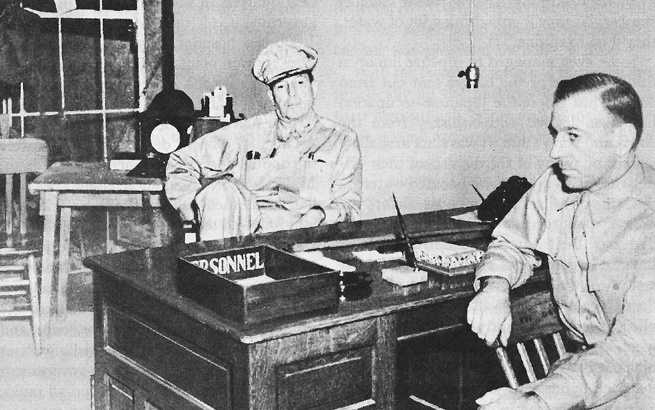
Generals Douglas MacArthur and Richard K. Sutherland at USAFFE HQ in the Malinta tunnel on the island of Corregidor, March 1, 1942. Source: U.S. Army Photo

The Malinta tunnel is a tunnel complex built by the United States Army Corps of Engineers on the island of Corregidor. Source: Wikipedia
On February 24, 1942, MacArthur received a message he would be appointed commander of all Allied troops in the Pacific. Owing to his knowledge of the area, he was the most logical option for the US supreme command. The Japanese troops also saw a change in command. Masaharu Homma was replaced by Tomoyuki Yamashita. This change in command caused a temporary pause in the fighting. The defenders benefitted from this, although only a quarter of them was deployable. MacArthur chose this moment to leave the Philippines. In the night of March 11 to 12 1942, he was evacuated from Corregidor with his wife and a few members of his staff. His departure, ordered by President Roosevelt did his reputation no good among his troops. They also felt hurt by the rumor he had opted to take many of his personal possessions, like books with him, instead of more of his subordinates. He left a large part of his library which allegedly consisted of over 5,000 books, behind though.
Command on the Philippines was taken over by Lieutenant-General Jonathan Wainwright. On arrival in Australia, he made his famous promise 'I shall return' to the assembled press. Probably this promise was also prompted by the financial reward, promised to him by the Philippine President Quezon in case he should recapture the islands.
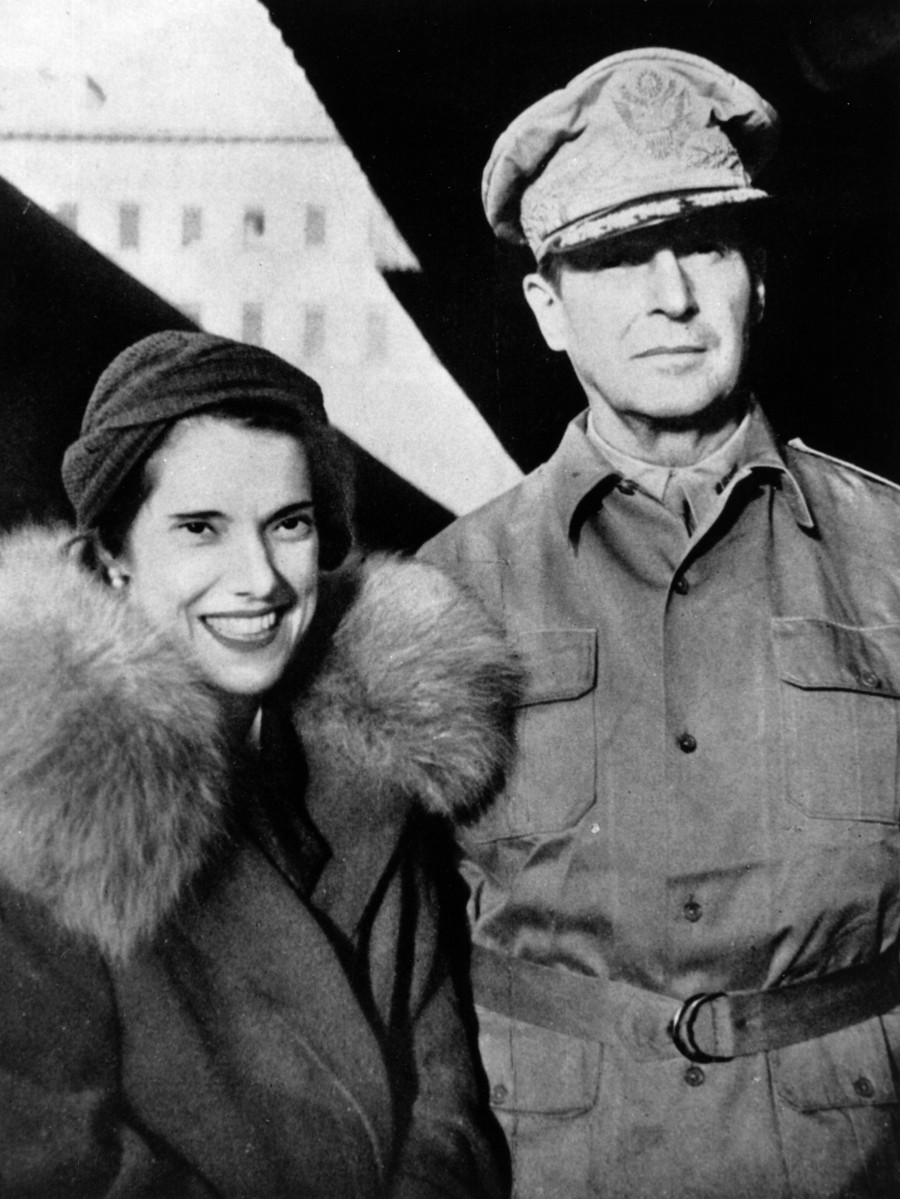
Arrival of General Douglas MacArthur and his wife on Adelaide railway station, March 20, 1942, after their departure from the Philippines. Source: State Library of Queensland
Later on, MacArthur declared about the campaign: Through the bloody haze of the sound of the last shot, I shall have a vision of grim, dreary looking dismal men who still have no fear.[7] On April 3, 1942, the Japanese went into the offensive again, having been reinforced with 21,000 soldiers and additional bombers. On April 9 the men on Bataan were forced to surrender. More than 75,000 survivors, among them 11,500 American soldiers, were forced by the Japanese to cover a distance of 62 miles on foot to a prisoner-of-war camp. Thousands[8] would perish during what came to be known as the Bataan Death March and the survivors would face years of Japanese imprisonment in which period numerous men would die from deprivation and torture. The Battle of the island of Corregidor, which was under fire from sea, land and air, would continue until May 7, 1942 Wainwright had to surrender with 13,000 men after the island was captured by Japanese amphibious troops.
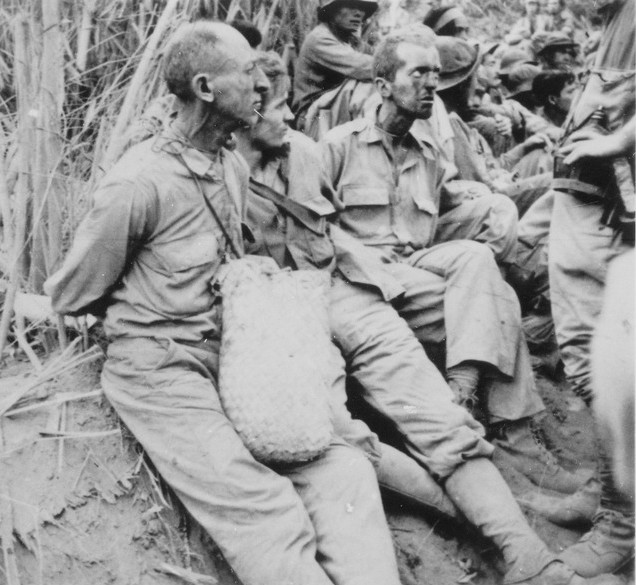
American prisoners, photographed during the Bataan Death March of 63 miles from Bataan to the prison camp of Cabanatuan. Source: NARA
For his defense of the Philippines, MacArthur was decorated with the Medal of Honor. Up to then, he was the only son within the American army to be credited just like his father. This decoration was also meant to counter Japanese propaganda which claimed he was a coward who had left his troops behind. He was blamed for the poor organization of the defense, leaving Manilla too early and for not stocking reserves on Bataan. These were not unfounded. Despite the shortages of men and equipment, according to many historians including Max Hastings and Mayer, MacArthur could have done more to prepare the Philippines for an invasion during the time he was based there. His treatment of Wainwright, before and after the battle, was highly unjustified as well. After his departure to Australia, MacArthur wrote to Washington that it was possible the strength of the defense would diminish after he had left. This while the fighting was under direct command of Wainwright throughout the entire campaign and MacArthur wasn't directly involved in it. He also issued the ridiculous order that Wainwright was to prepare an attack on the Japanese invasion force; knowing full well that the garrison lacked the energy and the means. He also resisted the awarding of the Medal of Honor to the general in captivity. His actions didn't justify this decoration, MacArthur said. (after the war however, the general would be awarded this decoration anyway.) During the battle, Eisenhower wrote in his diary: That poor Wainwright! He did the dirty work (…) [MacArthur] received every credit the public could think of (…) But he is a hero!. Hmm.[9]
Definitielijst
- capitulation
- Agreement between fighting parties concerning the surrender of a country or an army.
- invasion
- Armed incursion.
- Medal of Honor
- United States of America’s highest military honour. Awarded for awarded for personal acts of valor above and beyond the call of duty.
- offensive
- Attack on a smaller or larger scale.
- propaganda
- Often misleading information used to gain support among supporters or to gain support. Often used to accomplish ideas and political goals.
Commander-in-Chief South West Pacific
In his new function of CIC of the Allied Forces in the South West Pacific (SPA), MacArthur established his headquarters in Australia. Here, he continued to trust his own people. He had difficulty taking up Australian or Dutch officers and military from other parts of the army in his staff, certainly not in high positions. Contact with the navy and air force were uneasy at times. The relationship with Roosevelt, according to historian Carlo d'Este varied between frosty and downright disrespect.
Initially he commanded only a small number of men, just some 25,000 Americans and 20,000 Australians. At that moment in time there was little else he could do other than drafting press bulletins, aimed at keeping the morale in the US at high level.
The number of troops in the battle area rose quickly though. In 1942, even more American troops were sent to Australia and other areas than to Great Britain. According to Mayer, MacArthur had little to complain about but did so continuously nonetheless. Between him and the commanders of the navy, led by Chester Nimitz, an argument arose concerning the best strategy for this war. MacArthur wanted to recapture New Guinea from the Japanese first and then the Philippines. The navy advocated the capture of a number of centrally located islands in the Pacific, the so-called island hopping, in order to advance on Japan. In so doing, supplies to a number of enemy garrisons would be cut off. Eventually, a compromise was reached to the effect that the American armed forces would attack in both areas. This would be known as the double-axis policy. Only the United States, with her amazing production of ships and aircraft, were able to achieve this with such an abundant spreading of forces, British historian Anthony Beevor stated[10] This strategy meant that Japan would be attacked in various places simultaneously. Therefore they had to disperse their troops, which equally applied to the Americans. During the subsequent years, tension between the army (MacArthur) and navy (Nimitz) about the strategy to be followed would remain.
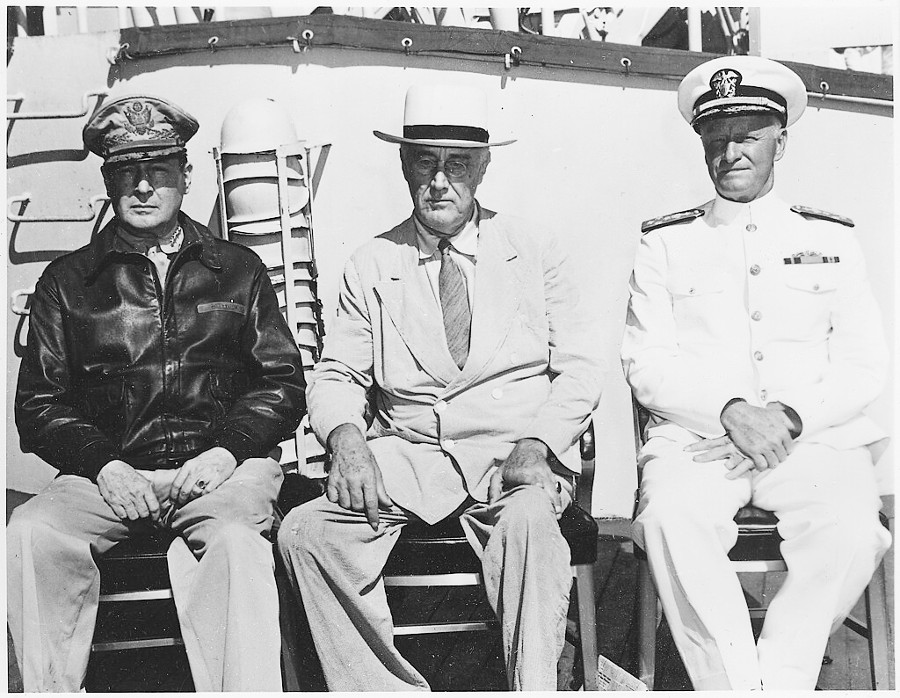
General MacArthur, President Franklin D. Roosevelt and Admiral Nimitz on Hawaii in 1944. Source: NARA
MacArthur was on bad terms with the commander of the air force in the Pacific, Lieutenant-General George Brett. They seldom talked to each other which hampered coordinated actions. When in July 1942, Brett was replaced by Major-General George Kenney, the latter demanded continuous access to MacArthur's office. The relationship between the two men improved and MacArthur was better informed about recent developments. Under his command, a good cooperation also emerged between land and air forces.
Definitielijst
- island hopping
- American strategy of conquering island after island to recapture the territory in the Pacific lost during World War 2.
- strategy
- Art of warfare, the way in which war should be conducted in general.
Combat on New-Guinea
On April 25, 1942, the supreme commander Southwest Pacific issued his first order. Among other things he stipulated that no landings would be permitted on the Southwestern coast of Australian New Guinea. Here, the Japanese prepared an attack on Port Moresby. As a result of the losses their navy had suffered during the Battle of the Coral Sea of May 5 to 8, they were unable to land troops there. Actually, the Americans had scored a victory but during this stage of the war, MacArthur was very pessimistic. On May 11, he told the Australian Prime Minister John Curtin the situation was critical.
His mood improved vastly after the Japanese defeat during the Battle of Midway on June 4, 1942. He wanted to make use of this victory to go into the offensive himself by capturing the Japanese naval base of Rabaul on New Britain. At that moment however, such an action was unwise. The aircraft carriers would be vulnerable to enemy air forces against which the Americans were unable to provide air cover.
Hence, the attack was waived. In July 1942, a strategy was set up whereby MacArthur had to capture New Guinea first. At that moment the Australians were forced into the defensive. As an invasion from the sea turned out to be impracticable after the Battle of the Coral Sea, the Japanese attacked Port Moresby over land. To that end, they first had to cross the Owen Stanley mountain range. The fighting on New Guinea would turn out to be the longest land campaign of the Second World War. Because of mountains up to 13,000 feet, the heat, high humidity and flourishing tropical diseases, the battlefield would grow into the most difficult of the campaign.
On August 25, the attack was launched. According to MacArthur, the Australians didn't fight hard enough although in reality, they managed to keep the Japanese away from Port Moresby. At the same time of the attack over land, Japanese Marines launched an amphibious attack near the southeastern tip of the island. Here, near Milne Bay, 2,000 troops came ashore with the aim to capture the airfield. After five days of fierce combat, the Australians managed to force the Japanese into the defense. The survivors were evacuated on September 4, 1942.
The advancing Japanese infantry managed to get to 31 miles from Port Moresby. Then they had to retreat though as their supplies had run out. Their supply lines had become very stretched out and were continuously plastered by the American air force.
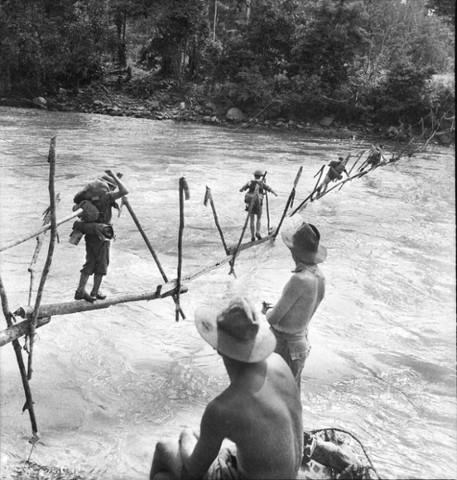
On their way to Buna, Australian troops cross a river on a make-shift bridge. Source: Australian War memorial
As the Australians hadn't managed to recapture the area around Buna and Gona because of the tough defense, MacArthur decided to deploy American forces. They fought against a numerical weaker and poorly equipped enemy. Yet they didn't manage initially to capture their allocated target, the town of Buna. The Japanese had constructed well camouflaged bunkers in the jungle and the Allied troops had trouble knocking them out as they had no heavy weapons. A new commander of the American troops near Buna was named. On November 30, 1942, MacArthur minced no words in his instruction about the goal of the attack. To Lieutenant-General Robert Eichelberger, commander of I Corps, he said: Bob, I want you to take Buna or not to come back alive. Eichelberger succeeded in his task. Afterwards, MacArthur showed one of his less pleasant traits. Numerous commanders nominated the victor of Buna for a Medal of Honer but the vain general spoke against this. In contrast, he did advocate pinning a medal on politician and future president Lyndon B Johnsson, whose achievement entailed nothing more than having flown one mission over enemy territory in a bomber as observer.
As late as January 1943, the Americans and Australians managed to break the resistance near Buna and Gona. The fighting slowly shifted northwards. In September 1943, the major enemy fortifications had been captured.
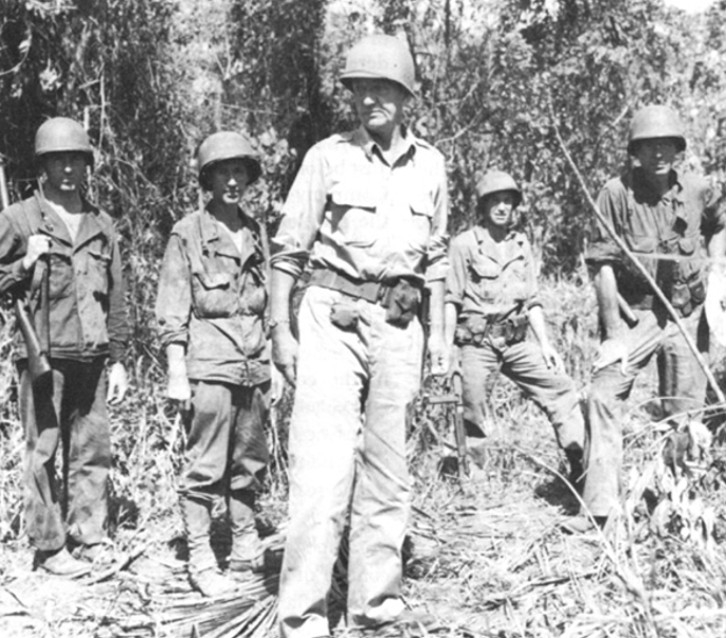
General Eichelberger and member of his staff looking a captured ground in 1942. Source: Centre for Military History
At the close of 1942, the Allies enjoyed air and sea superiority in the Pacific. MacArthur hoped he would be would be appointed over-all commander of the war against Japan. The 'viceroy of the Southwest Pacific', as Beevor called him, kept urging for more troops and equipment in a pretentious manner. He also continued issuing bombastic communiques, highly praising the Allies and then in particular the American achievements. He omitted the Australian successes. In so doing he gave the impression that the turn around on this battlefield was attributable to his actions only, such as the Battle of Midway in which he played no role whatsoever. His status of a hero grew. A senator even suggested nominating him for the Republican presidential candidate in the 1944 elections. In the end, this didn't occur though.
In March 1943 the Allied commander approved MacArthur's plan to not directly attack the Japanese base Rabaul but to isolate it by capturing neighboring islands. With this encircling strategy, called leapfrogging by MacArthur, attacks on heavily fortified bases could be avoided. Another advantage was, in this way he could advance on the Philippines faster. In order to execute this plan it was necessary that the Northern Solomon islands be captured. This area though was within the command of the CIC Southwest Pacific. Nonetheless, he agreed to the attack being carried out by the Marines. Admiral William Halsey was put in command of this operation.
The fighting on the Northern Solomons was long and bloody. At the end of August 1943, New Georgia was cleansed of Japanese. In November, the island of Bougainville was captured, isolating Rabaul. After numerous air attacks, vice-Admiraal Mineichi ordered Japanese naval vessels to leave the base. Therefore, these posed no danger anymore.
The battle on New Guinea continued. In September Laea was captured. The general ordered subsequent amphibious landings behind enemy lines. This was typical of his style. In his tactics, MacArthur emphasized flank attacks and pincer movements. If possible, he avoided frontal offensives and he attempted to isolate strong garrisons so they would, in his words, peter out and die. A total of no less than 56 landings would be carried out under his command during the war. He was also credited, certainly later in the war, for the close cooperation between the air, sea and land forces under his command
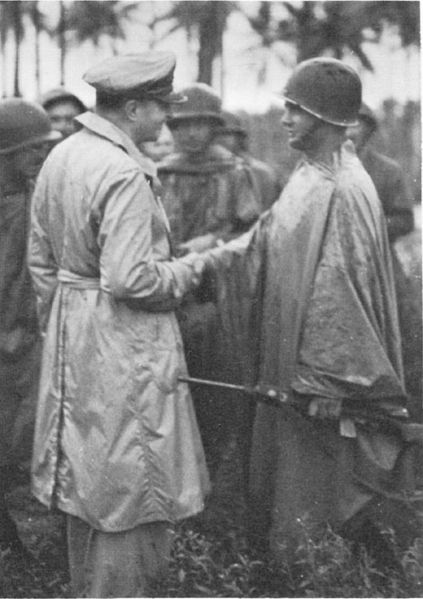
General MacArthur presents the Distinguished Service Cross to2nd Lt. Marvin J. Henshaw, the first man on Los Negros. Source: US Army
While the fighting on the large island was still raging, MacArthur planned an invasion of the Admiralty islands, 150 miles to the north of New Guinea. Reconnaissance had shown the Japanese base had been abandoned. Nonetheless, he took a big gamble when he launched the attack because he had a relative small number of troops at his disposal. The landings on February 28, 1944, attended by him personally, were successful though. The island of Los Negros with its Japanese base was captured. By this move the supply lines to New Guinea were cut off. A conflict did arise though about who should rule the island, the army or the navy. MacArthur charged Nimitz with hatching a conspiracy to undermine his authority. This eventually led to Los Negros being placed under the jurisdiction of William Halsey. This admiral was placed under MacArthur's command in 1943 and was the only naval officer with whom he would develop a sound relationship.
In April 1944, according to Hastings, MacArthur took his boldest and most dramatic step of the war when he captured Hollandia in an amphibious landing, encircling 40,000 Japanese troops. He was able to do so as the intelligence service had broken the Japanese code. This gave him a good insight of the weak spots in their defense so he had the element of surprise. More than once, attacks could be launched successfully as decoded information showed the location of Japanese troop concentrations. Later on, the CIC Southwest Pacific argued however that such actions had been the result of his own insight and he hushed up the role of the decoding branch. Once he even flatly ignored their warning. Despite messages, the Japanese garrison on Biak numbering over 7,000 men, he decided to launch an offensive as he and his staff assumed the occupation of the island would only be light. Actually, there were over 10,000 enemy troops, making the capture very bloody.
The usefulness of the campaign on New Guinea, where fighting would continue up to the end of the war, is questionable. The Japanese could have used the island as a springboard for an attack on Australia but after the battles of the Coral Sea and Midway, that danger had disappeared. A number of air bases had been captured and constructed, useful for the campaign in the Pacific but it is questionable when Japanese fighting power at sea and in the air had been destroyed, whether it had been necessary to drive them away from the north coast. Hastings indicates that the campaign got its own impulse and logic. After thousands of men had been deployed, human lives had been lost and the reputation of generals had been at stake, it gradually became more difficult to accept anything less than a victory.[11]
Definitielijst
- heat
- High-explosive anti-tank warhead. Shaped charge projectile to punch through armour. Used in e.g. bazooka or in the Panzerfaust.
- infantry
- Foot soldiers of a given army.
- invasion
- Armed incursion.
- Midway
- Island in the Pacific where from 4 to 6 June 1942 a battle was fought between Japan and the United States. The battle of Midway was a turning point in the war in the Pacific resulting in a heavy defeat for the Japanese.
- offensive
- Attack on a smaller or larger scale.
- resistance
- Resistance against the enemy. Often also with armed resources.
- strategy
- Art of warfare, the way in which war should be conducted in general.
I have returned
In September 1944, the CIC Southwest Pacific moved his headquarters from Brisbane to Hollandia. Now he could finally embark on the campaign he had been yearning for: the attack on the Philippines. The capture of the islands was, according to later historians, not necessary for the capitulation of Japan, certainly after the Americans had captured the Marianas in July, making air fields available to them from where they could bomb the Japanese home islands. The Allied air and sea superiority was so overwhelming that the Japanese forces in Southeast Asia could no longer be supplied, at least not in such a way they still posed a threat to the Allies. By American submarine attacks, delivery of raw materials to Japan diminished even further. In this situation, the country couldn't have held out much longer. MacArthur though was determined to fulfill his earlier promise to the Philippine population.
The rivalry between MacArthur and Nimitz remained. Nimitz wanted to advance on Formosa and bypass the Philippines. MacArthur on the contrary advocated the capture of the islands to cut off the delivery of raw materials to Japan completely. After his evacuation he had, in line with his promise, frequently urged for the liberation of the American colony. He received little support from the other commanders for this.
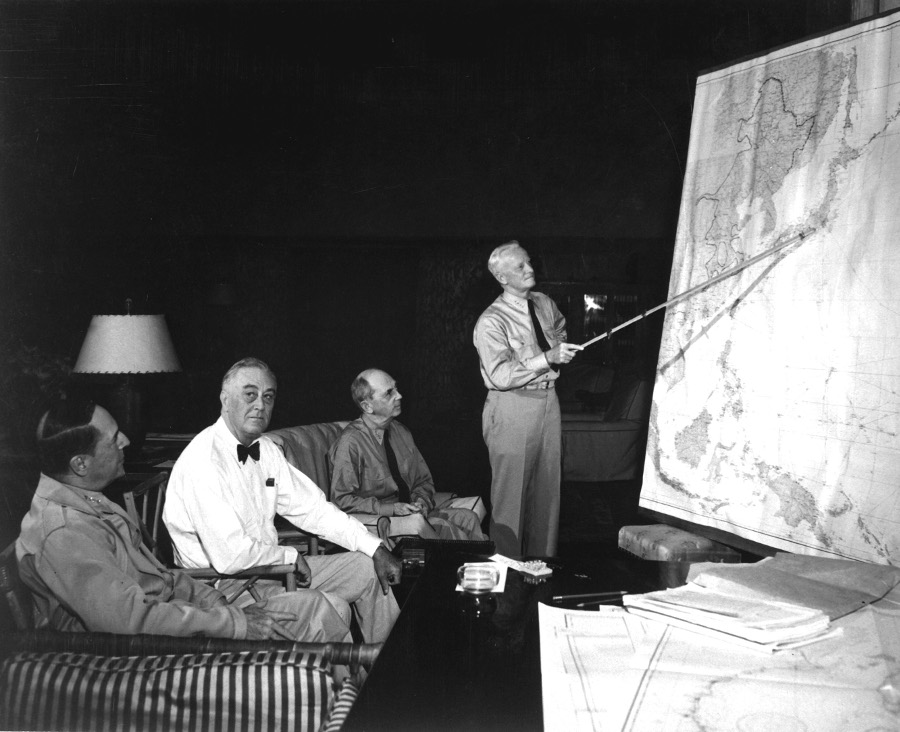
Consultation between President Roosevelt. General Douglas MacArthur, Admiral William D. Leahy and Admiral Chester W. Nimitz (pointing to Tokyo on the map) in 1944. Source: Library of Congress
On July 26, 1944, a meeting was held in Pearl Harbor to discuss the planning of the war in the Pacific. According to Beevor, MacArthur managed to convince Roosevelt with a mixture of charm and intimidation to capture the Philippines.[12] In his opinion it was a matter of honor. They had a moral obligation towards the Philippine population. This plan was supported by Roosevelt. He probably consented because the general assured him he wouldn't be running for president of the Republican party in the 1944 elections. According to Beevor, MacArthur knew exactly how to maintain his power and prestige. Even if it meant he would have to swallow his pride and give in to Franklin Delano Roosevelt.[13] In September, the Joint Chiefs of Staff consented to an invasion of the Philippine island of Leyte.
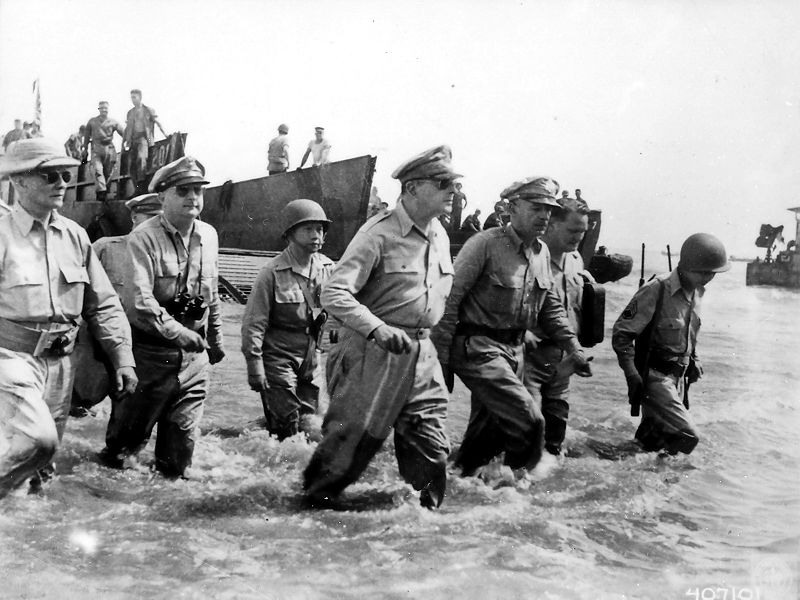
General MacArthur wading through the water from the landing craft on his return to the Philipines. He is accompanied by his Chief of Staff Lieutenant-General Sutherland and high ranking officers. President Sergio Osmena on the far left, Francisco Salveron, General MacArthurs aide de camp on the far right. Source: NAID
This landing took place on October 20, 1944. With a deployment of over 174,000 men, it was the largest operation in the Pacific until then. It was 41 years to the day on this spot that MacArthur had reported for his first stationing outside the USA. According to him, the Asian population valued these facts. After the beach had been secured, MacArthur made a great entry. Together with his staff officers and members of the Philippine government he sailed to the coast in a landing craft. As the vessel ran aground on a sand bank, he was forced to wade the last yards through the water, wetting his perfectly starched uniform. It is said that was the reason for his furious facial expression on the famous picture taken of this moment. After the Signal Corps had established a radio communication, the general delivered a speech which was broadcasted live. Referring to his earlier promise, he said: Population of the Philippines, I have returned! By the grace of our Almighty God, our troops are on Philippine soil once more.[14] He also called on the Philippinos to revolt against the Japanese occupier. This moment, meticulously orchestrated, was watched by dozens of journalists.
The Japanese troops on the Philippines were commanded by General Yamashita. He had 400,000 men at his disposal, of which 60,000 on Leyte. The Americans needed almost a quarter of s million men to clear the island. The battle took longer than expected, also because initially, the Japanese enjoyed air superiority after the American carriers, which had supported the invasion, had left. In the end, the Americans managed to recapture the island, due to their overwhelming fire power. MacArthur called it: Probably the largest defeat in the history of the Japanese army. This may be a little exaggerated but of the garrison that had received reinforcements from Luzon, some 60,000 soldiers died. It is remarkable though MacArthur made this statement in December 1944 when the battle on Leyte was still raging.
On December 18, 1944, MacArthur was promoted to General of the Army. This made him one of the select group of only five persons within the American Army who had been promoted to the rank of five-star generals.
Three days before, the island of Mindoro was captured. This was important because here, aircraft could be based to support the attack on Luzon. To this end, a strong naval force was established. The plan of attack showed strong similarities with the Japanese invasion in 1942. MacArthur boarded the cruiser USS Boise. On January 9, 1945, American troops set foot on Luzon. There were no enemies in the landing area. Nonetheless, the advance progressed not as quickly as MacArthur had hoped. This was more because of the situation of the terrain than Japanese resistance. MacArthur was at the front day and night. No one dared call him Dugout Doug anymore; on the contrary: Kenney declared: The guy is crazy. If he works overtime, he'll lose his membership of the union.[15] For one of his visits to the front on January 26, 1945, he was awarded his third DSC for having ventured to within 75 yards of the enemy lines, despite relentless fire'.
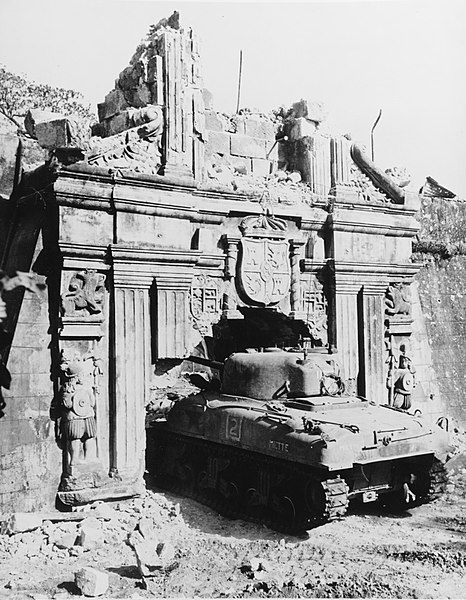
During the battle of Manilla on February 26, 1945 an M-4 Sherman tank enters the old Fort Santiago through a somewhat enlarged gate. Source: NARA
Yamashita knew he had an insufficient number of troops at his disposal to defend the entire island and had his troops move into positions in the mountains to the north. He ordered Manilla to be declared an open city. The commander of the navy, Rear-admiral Iwabatsji Sanji decided to defend the port anyway against this order. The army units still in town joined him. During the ensuing fighting, over 100,000 civilians were killed, not only by violence of war but also because they were murdered in their masses by Japanese soldiers. This made it the bloodiest battle of the Americans of the war. On May 3, 1945, the last resistance in town was broken. MacArthur wanted to move into his former headquarters, the Manilla Hotel. The building had survived the war so far, partly because the Japanese had established their headquarters in it. Shortly before MacArthur's arrival though, enemy troops set it on fire. The general witnessed how al his possessions he had left behind were being devoured by the flames.
To the north of Luzon, Yamashita and his men fought a long and bitter fight, claiming many American lives. This made it one of the bloodiest battles of the war in the Pacific. Although MacArthur declared victory on the Philippines on July 5, 1945, fighting continued anyway. Yamashita would only surrender when Japan capitulated on September 2, 1945. The five-star general had also planned to capture the Dutch East-Indies but Washington withheld permission. In the end, this sector was handed over to the British. After the war, he voiced his discontent about it. Had he been able to recapture the Indies, chaos wouldn't have erupted in the Dutch colony after the capitulation of Japan. In July 1945, an Australian force captured Balikpapan. That was the last offensive operation under MacArthur's command in the Pacific. He assumed himself the war would last another year. He also made this clear to the new president Harry Truman. Meanwhile, use of the atom bomb against Japan had been decided on already. MacArthur wasn't involved in the negotiations with the Japanese Empire either.
Definitielijst
- capitulation
- Agreement between fighting parties concerning the surrender of a country or an army.
- cruiser
- A fast warship with 8,000 – 15,000 ton displacement, capable to perform multiple tasks such as reconnaissance, anti-aircraft defence and convoy protection.
- invasion
- Armed incursion.
- moral
- The will of the troops/civilians to keep fighting.
- offensive
- Attack on a smaller or larger scale.
- resistance
- Resistance against the enemy. Often also with armed resources.
Governor of Japan
When Japan surrendered on August 15, 1945, MacArthur was tasked with the organization of the capitulation and occupation of the conquered land. Talks with the Japanese delegation progressed smoothly. Rivalry among the American commanders remained though. This led to a conflict regarding what shape the capitulation should have. In the end, a compromise was reached which entailed that MacArthur would be in charge of the ceremony aboard Nimitz' flagship, the battleship USS Missouri.
On August 28, 1945, MacArthur arrived in Japan. He now had the rank of Supreme Commander of the Allied Powers. The commander landed on Atsugi airport where he was received by Eichelberger. The route to his temporary headquarters, the Grant Hotel in Yokohama, was lined by no less than 30,000 Japanese soldiers. Up to then, such a large guard of honor would only be reserved for the Emperor. MacArthur insisted that the generals Wainwright and Arthur Percival, who had spent years in Japanese captivity, should attend the capitulation ceremony. The reunion between Wainwright and MacArthur was emotional. The first, who had suffered visibly in his captivity declared he had discredited his country by surrendering and begged for forgiveness. MacArthur understood and offered him command of his former army corps.
On September 2, 1945, the official signing of the capitulation agreement took place aboard the American warship. MacArthur consciencely opted to wear a uniform without decorations. After all those involved had embarked, he delivered a short speech. Thereafter, at 09:04 the Japanese delegation signed first, MacArthur was next and he was followed by the rest of the Allied representatives. After the signing was over MacArthur, in closing, expressed the wish that from that moment on, the world could continue to exist in peace.[16]. The ceremony ended with a fly-over of hundreds of American combat aircraft.
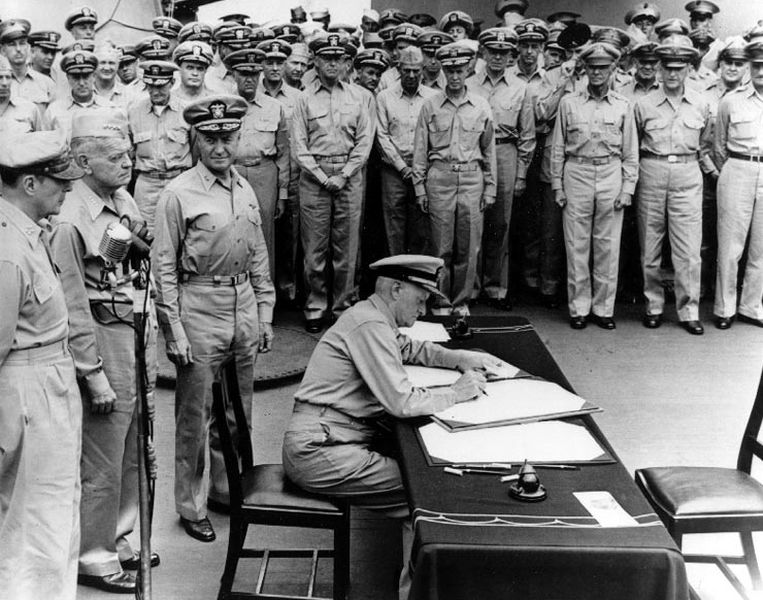
Fleet Admiral Chester Nimitz signs the agreement on behalf of the United States. Source: Courtesy of Michael W. Pocock
Being the supreme commander of the Allied forces, MacArthur took charge of the defeated country. In contrast to Germany, the country wasn't split up in zones of occupation. The Americans bore the brunt of the responsibility and the supreme commander was in fact the sole ruler of the islands. His headquarters were located in the building of the Dai Ichi insurance company. Soon, a pattern arose. The governor arrived at 10:00 in the morning. At 14:00 he went home for lunch after which he returned to his office at 16:30. His working day lasted until 21:00 or even later. He didn't break this pattern for the weekends or holidays. He had no days off. According to many of his staff officers, their presence wasn't required in fact as MacArthur took all decisions himself anyway.
Although it had been stipulated officially, the Emperor would be subordinate to Allied authority, MacArthur insisted the honor of Hirohito and his people remain unblemished, hence he maintained the form of address Chin. According to the general any impairment of the Emperor would lead to unrest among the Japanese population that could only be crushed by violence. He did order the Emperor he should relinquish his god like status though. From then on, he was a 'normal' constitutional monarch. In order to emphasize this he had a picture of him and the Emperor published in all newspapers. MacArthur stood one head taller than Hirohito, making the latter look somewhat tiny.
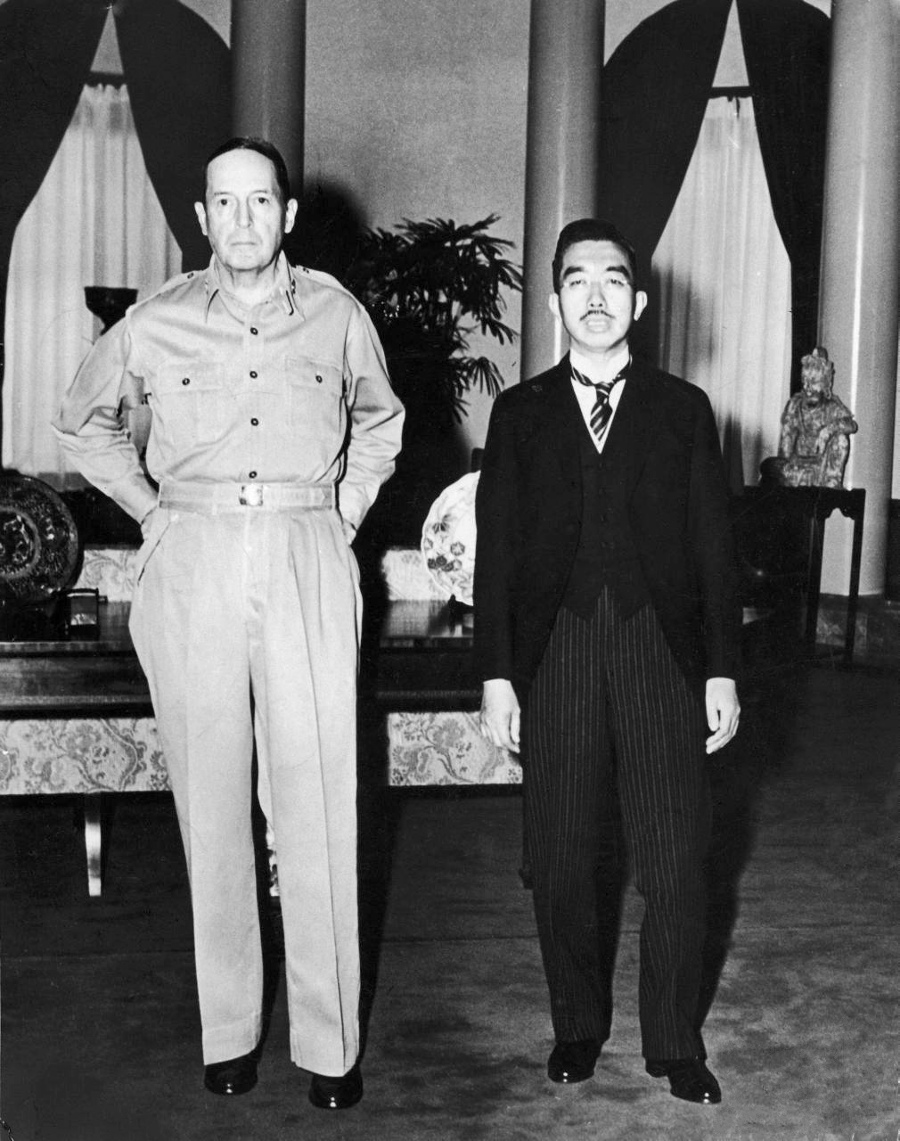
General MacArthur and Emperor Hirohito, at their first meeting in the American Embassy in Tokyo.September 27, 1945. Source: U.S. Army photographer Lt. Gaetano Faillace
MacArthur arranged the changeover from dictatorship to democracy in the Japanese Empire. To that end, he drafted a new constitution, constraining the role of the Emperor. The constitution also guaranteed freedom of religion and press and women's suffrage was introduced. From then on, the Japanese army was only to be deployed in self-defense. The law also ended the power of a number of family cartels in industry. These reforms met much resistance at first but the American occupiers stood their ground and enforced these rules. Most of MacArthur's constitution is still valid in the country.
After the capitulation, one of the more unpleasant episodes from MacArthur's career began. In 1938 the Japanese had founded Unit 731. This unit had busied itself in China with the investigation into and application of bacteriological war fare. Hundreds of prisoners fell victim to cruel experiments. In addition, thousands of Chinese civilians died from the deliberate spreading of pathogens like the plague and cholera bacteria. As according to the general, the data of Unit 731 were of interest to the Americans, he offered them a free pass. None of those involved have ever been prosecuted; even when it became known that American prisoners-of-war had been killed in the laboratories of Unit 731, MacArthur prohibited investigation into and prosecution of the Japanese military involved.
As lenient he was towards Unit 731, he was all the more combative towards Yamashita. He insisted on a trial against him. MacArthur probably acted in this way partly out of revenge because of the defeat in 1942 The Japanese wasn't tried by a judicial body but by a military committee, selected by MacArthur personally consisting of generals with little judicial experience. Even before sentence was passed, the supreme commander made no secret of his opinion that Yamashita should be hanged and that he wouldn't accept another verdict. This verdict was passed and on February 23, 1946, the Japanese general was executed. The mass murders that had taken place in Manilla were aggravating circumstances. In that case however, Yamashita had little to be blamed for. As mentioned earlier, he had ordered Manilla to be declared an open city. Partly for that reason, his sentence was and still is contested. It must be mentioned however that although Yamashita bore little responsibility for the blood bath in Manilla, in 1942 he did order the large scale murder of Chinese in Singapore. After the war, the British therefore demanded his extradition. If he hadn't been sentenced in the Philippines, he probably would have been sentenced to death anyway for his involvement in other war crimes.
In Europe, during the Nuremberg Trial, a number of the major German war criminals were tried. In Tokyo a tribunal was established as well where the Japanese bearing most of the guilt of the war and perpetrators of the Japanese atrocities were taken to court. MacArthur drafted the charter for this court. He used the London Charter as an example, which he copied verbatim, albeit with a few minor adaptations. There was a semblance of political involvement around the Tokyo trial. Dwight D. Eisenhower, the Allied supreme commander in Europe, had kept far away from the trial. MacArthur however made full used of his influence. He determined who would be prosecuted and who wouldn't. For instance, he decided on his own that Emperor Hirohito wasn't to stand trial as this would cause too much unrest among the Japanese population. He also stipulated which lawyers would act as judges. This was a judicial problem. MacArthur played first violin in Tokyo. He determined what the charter should look like, he appointed the judges, used his influence to keep the 'major criminals' out of sight and rejected pleas of clemency. He didn't pass sentences but in many aspects it was his trial former judge Norbert Ehrenfreund stated.[17]
Soon, MacArthur gained popularity among the Japanese, in particular because he managed to improve the precarious food situation quickly. This earned him the nickname Gajen Shogun (foreign Shogun). In 1949, ruling of the country was transferred to the Japanese government. MacArthur maintained his residence in Tokyo though. He could have stayed there until his retirement but history took another turn.
Definitielijst
- battleship
- Heavily armoured warship with very heavy artillery.
- capitulation
- Agreement between fighting parties concerning the surrender of a country or an army.
- democracy
- From the Greek: demos (the people) kratein (rules). Democracy is a form of government elected by the majority of the people in which the people can check on the leaders and have the government resign in case a majority of the people no longer agrees with the government.
- dictatorship
- A form of government where the power in a country is in the hands of one person, the dictator. Originally a Roman regime in case of an emergency where total power would rest with one person during six months in order to face a crisis.
- resistance
- Resistance against the enemy. Often also with armed resources.
- war crimes
- Crimes committed in wartime. Often concerning crimes committed by soldiers against civilians.
The Korean war
After the surrender of Japan, control over the occupied areas was distributed among the various Allied powers. This resulted in the Korean peninsula, a former Japanese protectorate and in fact a colony, being split up into an occupation zone for the Americans and one for the Soviet Union. From this, two states emerged: Communist North-Korea ruled by Kim Il Sung and capitalist South-Korea ruled by Sygman Rhee.
The North-Korean dictator aimed at reuniting the peninsula under Communist rule. On June 25, 1950, he launched an attack. 90,000 of his troops, well supplied by Soviet material, crossed latitude 38. The South-Korean army, poorly trained and armed, was no match.
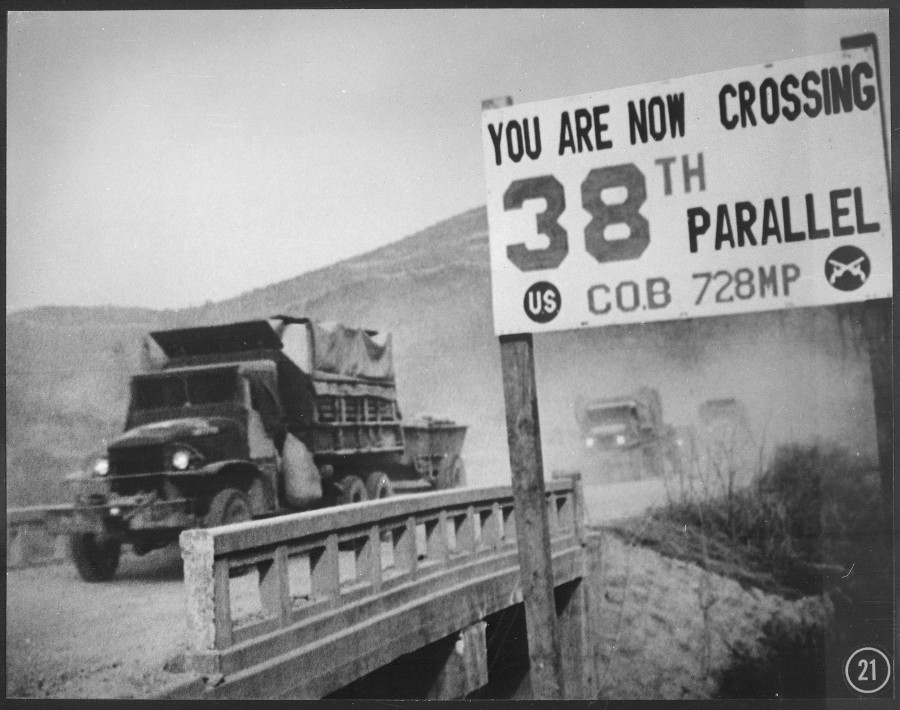
Latitude 38, after the Second World War labeled as temporary border between the north and south part ofthe Korean peninsula during the war. Source: NARA
On the same day, the North-Korean attack was denounced in a UN resolution. On June 27, 1950, the Security Council issued a mandate to establish an army to come to the aid of South-Korea. The Council was able to do this as at that moment, the Soviet Union boycotted the assembly because of its refusal to grant a seat to the People's Republic of China. MacArthur was put in command of these forces. It was logical. At the moment he was the highest ranking commander in the area. Yet his appointment met criticism. Journalist James Reston wrote that MacArthur had never shown a natural talent for international cooperation, unlike Dwight Eisenhower. According to the journalist, the supreme commander also lacked the tact and the ability to reckon with the opinion and feelings of others while these characteristics were essential for his new position.[18]
According to Hastings, MacArthur showed another point of view of the conflict than the American government. He didn't believe the conflict would be limited to the Korean peninsula. He expected a global confrontation with Communism in which the Americans had the advantage of being the only power with nuclear weapons in its arsenal. He also assumed he would have a free hand as to the deployment of his troops, just like during the previous war. The US however wanted to do anything to prevent the conflict from escalating any further. The president, calm and thoughtful Harry Truman and the arrogant supreme commander differed widely as to characteristics. In intellectual respect, MacArthur felt himself elevated far above the 'peasant' Truman. In his turn, he typified the general as 'mister Prima donna' and an actor crushed by his own ego. Regarding the different viewpoints and convictions, it wasn't surprising this would lead to a crisis between the president and his highest subordinate on the battlefield.[19]
Soon after his appointment, MacArthur paid a lightning visit to Korea. In his words, he was already drafting plans for an amphibious landing. He advocated transferring all available American ground forces in the region to Korea. President Harry Truman agreed to his. The American conscripts, who had been hastily transferred to the Korean peninsula had no battle experience at all. As to weaponry and in particular in numbers, the North-Koreans enjoyed supremacy.
At the end of the Second World War, the American army had been downsized considerably, from 89 divisions to 10. Their level of training and state of readiness were deplorable, something for which later on MacArthur, their supreme commander, would blame everyone except himself.[20] In July 1950, American and South-Korean troops achieved few successes. The Korean war showed the problems of pitting a modern, highly mechanized Western army against a lightly equipped enemy in an inhospitable country.[21] Much terrain had to be given up. More than once, the retreat of a unit turned into a chaotic flight. Yet, the Western army managed to inflict heavy losses on the North-Koreans. In early August, the American/South-Korean troops commanded by Lieutenant-General Walton Walker, managed to halt the North-Korean advance 31 miles from the port of Busan.
While many in the armed forces were convinced all reinforcements should be sent to Busan, MacArthur was pondering a landing near Incheon as early as July. Initially, he met little support. Many officers remembered from their time during the previous war such amphibious invasions could result in heavy losses and that success depended on numerous circumstances. They were hardly willing to expose troops, hastily assembled, to the risks. MacArthur however was an ardent advocate of an invasion behind North-Korean lines. He compared it to a fan when its plug is pulled from the wall socket. Once we are ashore near Incheon, the North-Koreans have no other choice than to pull the plug at Incheon and retreat or else surrender.[22] Incheon was the only harbor suitable for a landing. Local circumstances were not ideal however. The tidal difference was no less than 30 feet. Therefore there were only a limited number of days, before the onset of winter, when the tide was high enough for an invasion fleet. There could be no question of a surprise attack either as the island Wolmi-do, located off the coast, should be secured before the port could be stormed. In addition, the area surrounding the landing could be defended strongly.
On August 23, 1950, a meeting was held in the Dai Ichi building to discuss the invasion. Nearly all those attending voiced sensible objections. Then MacArthur rose and delivered one of his theatrical speeches. He highly praised the US navy and continued with tears in his eyes: I never imagined the day would come at which the navy wouldn't be able to support the army in an operation.[23] He fiercely defended his operation. As it seemed impracticable, they could use the element of surprise to their advantage. We will beach near Incheon and I shall crush them. Admiral Forest Sherman, Chief of Naval Operations, subsequently declared emotionally General, the navy will take you to Incheon. This meeting was the turning point. Although doubts remained within the top of the army and the navy, on August 28, 1950, the Joint Chiefs of Staff gave their permission for the operation.
Urged by MacArthur, Lieutenant-General Edward Almond was put in charge of the amphibious operation. This caused the military command in Korea to be split in half. The decision met fierce criticism later on. The supreme commander however considered Walker unable to lead the operation.
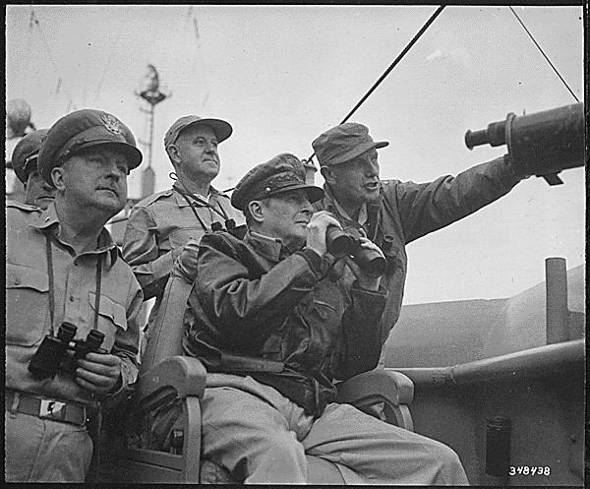
Brigadeer-General Courtney Whitney, General Douglas MacArthur, Commander-in-Chief of U.N. Forces and Major General Edward Almond, observing the bombing of Incheon from USS Mount McKinley, September 15 1950. Source: NARA
The invasion near Incheon was launched on September 15, 1950. MacArthur observed it in full dress (including sunglasses and corn pipe) from the bridge of USS Mount McKinley. It was considered a masterly move by all. The North-Korean troops were completely surprised and offered only little resistance (there were only 20 American dead to mourn). After the invasion, the American troops advanced relentlessly. The Communist front collapsed. On September 26, the invasion troops and units of the forces from Busan who had started their own advance, met each other. The same day Seoul was captured after fierce fighting. On September 29, 1950, a bombastic, MacArthur-style ceremony was held to celebrate the victory and the return of the South-Korean government, Thanks to the generosity of the Merciful Providence, fighting under the flag of what is the greatest hope and inspiration for humanity, the United Nations, this age-old capital of Korea has been liberated, MacArthur said in his speech.[24] During one of his visits to the front, he and the journalists accompanying him, came under fire. He remarked dryly that the North-Korean snipers were poorly trained.
Right from the beginning, MacArthur had made it clear he wouldn't be satisfied with just driving Kim Il Sung's troops from South-Korea. He wanted to bring his regime down. The Chiefs of Staff permitted an advance across latitude 38, provided no action would be taken on Chinese or Soviet territory. On October 9, 1950, American troops crossed the pre-war border. Initially they met fierce resistance but after a week, the North-Korean troops fled. Their capital Pyongyang fell and rumors circulated that Kim Il Sung had escaped to China.
MacArthur personally set an ultimatum to the North-Korean soldiers, ordering them to lay down their arms. In doing so, he overstepped his mandate and his constitutional authority as commander of the troops.
MacArthur had been ordered by Washington not to deploy American but only South-Korean troops in the Chinese frontier area. He cared little about this though. On October 24, 1950, he ordered Almond and Walker to deploy all ground troops in order to secure North-Korea. In doing so, he went straight against an order from higher up. One day later, the troops reached the river Yalu, the border with China. Then the first skirmishes against Chinese troops erupted. The Communist regime under Mao Tse Tung had warned more than once that an advance up to her borders wouldn't be tolerated. From October 1950, troops of the People's Liberation Army advanced into North-Korea. The regime in Beijing talked continuously about the troops being volunteers but actually they were anything but. Headquarters in Tokyo were informed about the presence of Chinese troops on the battlefield. MacArthur's intelligence officer Charles Willoughby, one of the members of the Bataan Gang, played this down deliberately in his report to the supreme commander. Partly because of this, the latter paid little attention to the warning. In subsequent reports, Willoughby did all he could to confirm MacArthur's assumption the Chinese wouldn't go into the offensive.
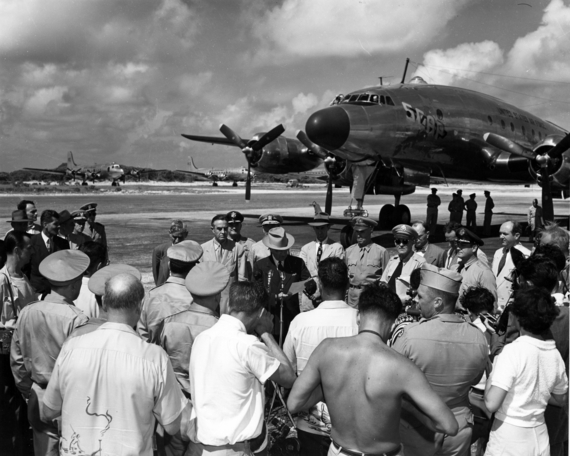
President Harry S. Truman on Wake Island, where he delivers a speech and decorates General Douglas MacArthur with the Distinguished Service Medal, fourth Oak Leaf Cluster. Source: TrumanLibrary.org

General Douglas MacArthur being decorated with the Distinguished Service Medal, fourth Oak Leaf Cluster by President Harry S. Truman. Source: United States Navy Signal Corps
On October 15, 1950, MacArthur and Harry Truman met personally for the first time on Wake island. The general was upset because he was being summoned by a bunch of politicians for whom he had chosen the location himself by the way. Demonstratively, he had the president wait, refused to salute him and skipped the joint lunch. According to Hastings, Truman and his entourage missed an opportunity here to call the supreme commander to order and convince him he was to adhere to the instructions of his government.
In November 1950 – according to D' Este – MacArthur made the biggest blunder of his career by announcing the war had been won and the troops would be home by Christmas. In reality, the Chinese had launched their offensive however. As a result, various units of the 1st Cavalry Division had been wiped out. Despite the success, the attack was aborted however; probably because the Chinese had problems with supplies and coordination.
On November 26, the Chinese resumed their offensive. After the attack, the UN troops lost over 20,000 men in 10 days. Despite the massive deployment of air force and artillery, they were unable to overcome the Chinese numerical superiority. The Americans and their allies had to make a fighting retreat through inhospitable terrain and fierce winter conditions. The Marines however remained a coherent fighting force, despite heavy losses. This however could not prevent the evacuation of the port of Hamhung on December 11. This was the first defeat of the US Marines. Eighth Army did much worse. Various units broke up and were driven back across latitude 38. Even the capital Seoul was occupied again.
During the Chinese advance, MacArthur issued several (press) messages that gradually deviated further from reality as days went by.[25] He urged the deployment of nuclear weapons in the Korean conflict and attacks on Chinese territory. The Chinese advance could only be stopped in this way, so he argued. This was against the sore toes of the American government that wanted to avoid a large-scale confrontation with China and with her the Soviet Union. He also wanted to deploy nationalist Chinese troops in Korea.
If that wasn't bad enough already, Walker was killed in a car crash on December 23, 1950. Thereafter, Lieutenant-General Matthew Ridgway took command of Eighth Army. This turned out to be a fortunate choice. He created a higher morale among his soldiers. Meanwhile, the Chinese offensive had lost its striking power partly because of the overstretched supply lines. The UN troops launched the counterattack.
As the American troops were approaching latitude 38 again in March 1951, Truman wanted to talk about peace. MacArthur did not agree and even voiced this in public although Truman had imposed a speech ban on him. Mac kept urging for an attack on China. A dozen nuclear bombs would bring the country to its knees, he argued. On March 24, 1951 the supreme commander – again overstepping his mandate – set the Chinese an ultimatum to end hostilities. In his opinion, the period in which the U.S. could limit her military deployment in Korea was over. To Truman, who was attempting to achieve a cease-fire, this was the straw that broke the camel's back. The ultimatum, his disagreement with the civil authorities and his improper conduct towards the American president, made his position untenable. On April 6, 1951, Truman held a meeting in the White House. Various participants advocated the discharge of the supreme commander. This verdict was shared by the Chiefs of Staff, led by General of the Army Omar Bradley. It was intended to publish the verdict on April 12 but after the press had threatened to leak it ahead of time, publication was advanced a day.
This didn't prevent the supreme commander however from learning about his discharge through the media. On April 11, 1951 he was relieved of his command of the forces because of insubordination. Ridgway was named his successor. MacArthur growled he had been fired like a common housekeeper.
His discharge wasn't undisputed. A poll showed public opinion was against it. Truman was blamed for having fired one of America's greatest military heroes. Senator Joseph McCarthy, who would be known for hunting down (alleged) Communists, saw it as proof that followers of the Soviet Union were gaining evermore influence in the US. Another Republican who would become known later, Richard Nixon wanted MacArthur reinstated. Outside the US though, the discharge was met by enthusiasm and relief.
Other military and later historians, among them Hastings, agree and agreed with the president. His power of judgement had disappeared, the British historian stated: He was too absent, too old, too inflexible, too much a prisoner of a world view long since disappeared, to be a suitable commander for a war like the one in Korea.[26] According to D' Este, MacArthur had not only messed up the war but had also violated the principle that military do not determine foreign policy. Truman's courageous decision was fully justified and was confirmed later by a Congressional investigation. Their conclusion was partially based on testimonies of the former Secretary of War George Marshal and Omar Bradley who was Chief of Staff at the time. They argued that MacArthur's actions would have plunged the United States in a disastrous and unnecessary war against China and possibly against the Soviet Union as well.
Definitielijst
- Cavalry
- Originally the designation for mounted troops. During World War 2 the term was used for armoured units. Main tasks are reconnaissance, attack and support of infantry.
- Communism
- Political ideology originating from the work of Karl Marx “Das Kapital” written in 1848 as a reaction to the so-called class struggle between the proletariat (labourers) and the bourgeoisie. According to Marx the proletariat would take over power from the well-to-do classes though a revolution. The communist movement aspires an ideal situation where the means of production and the means of consumption are common property of all citizens. This should end poverty and inequality (communis = common).
- invasion
- Armed incursion.
- Marshal
- Highest military rank, Army commander.
- offensive
- Attack on a smaller or larger scale.
- resistance
- Resistance against the enemy. Often also with armed resources.
- Soviet Union
- Soviet Russia, alternative name for the USSR.
End of his career
MacArthur remained very popular among the American population. In D' Este's words:on his return to the US, he was received with an outburst of public adoration.[27] In numerous cities, parades were held in his honor. With 7.5 million spectators in New York, he drew more people than Eisenhower at the time of his return home. He was invited to address a joint meeting of Congress on April 19, 1951. The speech was aired nationwide. MacArthur declared he had only done his duty and that he had served the country for 52 years. He ended with a quote from a soldier's song 'Old soldiers never die, they just fade away': Just like the soldier from the ballad, I now end my military career and just fade away. An old soldier who has tried to do his duty, like God made him to understand that duty.[28]
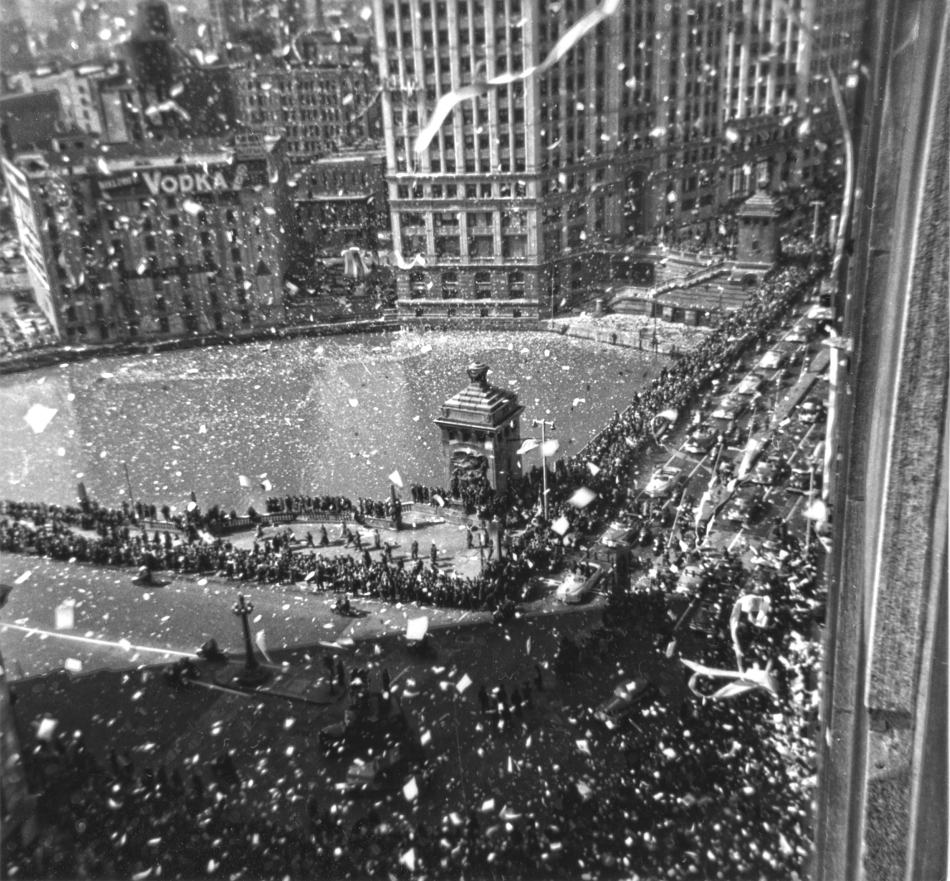
Generaal MacArthur being received in Chicago with a massive ticker tape parade 1951. Source: APRAD BY-SA 4.0
His words turned out to be more prophetic than he had probably expected himself. After his return to the US he did fade away indeed. He settled in a penthouse in the Waldorf Astoria Hotel with his family. From there he wanted to run for president on behalf of the Republican Party. In his campaign, he advocated abolishment of social security, a confrontation with the Soviet Union and more. He could count on little support though. During the Republican convention, he won just 10 votes. His former subordinate, Dwight Eisenhower was selected as the Republican candidate and eventually won the election.
After MacArthur's departure, the fighting in Korea went both ways for some time until the front stabilized around latitude 38 in November 1951 Thereafter, a trench warfare broke out, very similar to the fighting in Belgium and Northern-France during the First World War. All this while at the same time, tedious negotiations dragged on about a cease-fire which was signed eventually on July 27, 1953.
On November 17, 1952, the brand new president and the old general met. MacArthur unveiled a somewhat weird plan how to end the war in Korea. It entailed, among other things, plastering North-Korea with nuclear bombs and deliberately covering the country with a layer of radioactive material. This plan made clear that MacArthur still didn't understand the moral implications of the deployment of nuclear weapons. Hastings typifies this as a sad epilogue of a grand military career.[29] It goes without saying Eisenhower rejected this utterly audacious plan. He pointedly indicated a new political reality had been born. America's allies were fiercely against an expansion of the war and MacArthur's plan would certainly have led to just that.
MacArthur's advice would be asked for a few times by Eisenhower and also by his successors. In that capacity he urged not to send military to Vietnam. This advice wouldn't be heeded though. During a visit to John F. Kennedy in the White House, he allegedly would have remarked: I should have been living here really.
Definitielijst
- First World War
- Took place from 1914 till 1918 and is also named The Great War. The conflict started because of increased nationalism, militarism and neo-colonialism in Europe. Two alliances battled one another during the 4-year war, which after a dynamic start, resulted into static trench warfare. The belligerents were the Triple Alliance (consisting of Great-Britain, France, and Russia; later enlarged by Italy and the USA, amongst others) on the one hand and the Central Powers (consisting of Germany, Austria-Hungary, Bulgaria and the Ottoman empire) on the other hand. The war was characterized by the huge number of casualties and the use of many new weapons (flamethrowers, aircraft, poison gas, tanks). The war ended in 1918 when Germany and its allies surrendered unconditionally.
- moral
- The will of the troops/civilians to keep fighting.
- Soviet Union
- Soviet Russia, alternative name for the USSR.
Epilogue
Opinions about MacArthur remain varied. Military historian Carlo D' Este called him one of the greatest military who ever wore an American uniform.[30] He praises him as the most dynamic general in American history. It cannot be denied he had led a life full of great and courageous adventures. He had a brilliant but not flawless military career.
Someone who came to know him on the Philippines, remarked: People adored him or hated him while he was on a different mental wave length all the time and probably seldom aware of the worship and the hate.[31]
Mayer judged: It is no use to run MacArthur down as a general. Although he made military mistakes, only a few could stand in his shadow. He declared that MacArthur's optimism was his greatest enemy. After a defeat, he frequently had to admit he had overestimated the power of the Allies. His pomp and his competence were equaled by a larger-than-life ego and a yearning for drama. For him, a victory wasn't good enough. It was all about honor and he did all could to remain in the lime light. In Hastings' words, the PR machine at MacArthur's headquarters was probably the most effective department.[32] That emerged when in 1945, American correspondents in a poll named him their greatest general, way ahead of Dwight Eisenhower and George Patton. Other famous generals like Alan Brooke and Bernhard Montgomery praised his military competence and tactical insight as well.
Hastings is a lot less favorable about the general. He sooner typifies MacArthur as a vain dog than as a remarkable commander with a nasty character.[33] The historian fiercely denounces the campaign on the Philippines of 1944-195. He claims the Americans could have aborted their ground operations in July 1944 just as well. That goes a little too far. Fact is though, the capture of the Philippines didn't force the Japanese to surrender. With its last bloody campaign on the islands, America hardly achieved anything that could have ended the war sooner, according to him. The Philippine population paid the price for MacArthur's ego-tripping with lives. In 1944, America was marching relentlessly towards a victory over Japan but the assumptions of the supreme commander South West Pacific blemish this feat of arms.[34] He remarks himself though that in hindsight, this verdict is easier for historians that for national policy makers at the time.
In his words, MacArthur distinguished himself more by the glow of his self-image as a war lord than by his competence as field commander. His victories were determined by the supremacy of his means, in particular air support.[35] Hastings also acknowledges MacArthur possessed a certain grandeur that didn't let it be tarnished, as much as he did his utmost for it from the autumn of 1950 until his death.[36]
MacArthur certainly possessed military professionalism and strategic insight, although this was at one time clearer than at other times. He wasn't the inventor of the concept of amphibious landings but did apply it very successfully
His arrogance and this overconfidence were both his power and his doom. As to most generals, their career would have been over if they had been defeated like on the Philippines in 1942 and for having left the battlefield ahead of time. MacArthur managed to maintain himself at the top while initially he had little more to contribute than his own bravado. He saved South-Korea from its downfall. The landing at Incheon showed his daring which bordered on overconfidence. It is questionable whether a less excentric commander would have taken the same step. Precisely these characteristics subsequently led to a confrontation with China.His tendency throughout his career to surround himself with flatterers, who only told him what he liked to hear, led to his downfall in Korea, according to D'Este. They played down the Chinese presence in the Korean countryside.
In 1962 he delivered his last speech in public to a group of young cadets at West Point. From his early youth until advanced age, he retained affectionate feelings towards the military academy where he, in his own words, would always return to in the dusk of his memories. Referring to his words, he felt his end approach: The shadows grow longer for me…. More than anyone else, the soldier prays for peace because he has to bear the wounds and scars of war but the warning of the words of Plato, the greatest of all philosophers, ring in our ears: 'only the dead have seen the end of the war' I bid you goodbye.[37] Two years later, on April 5, 1964 he died from liver failure.
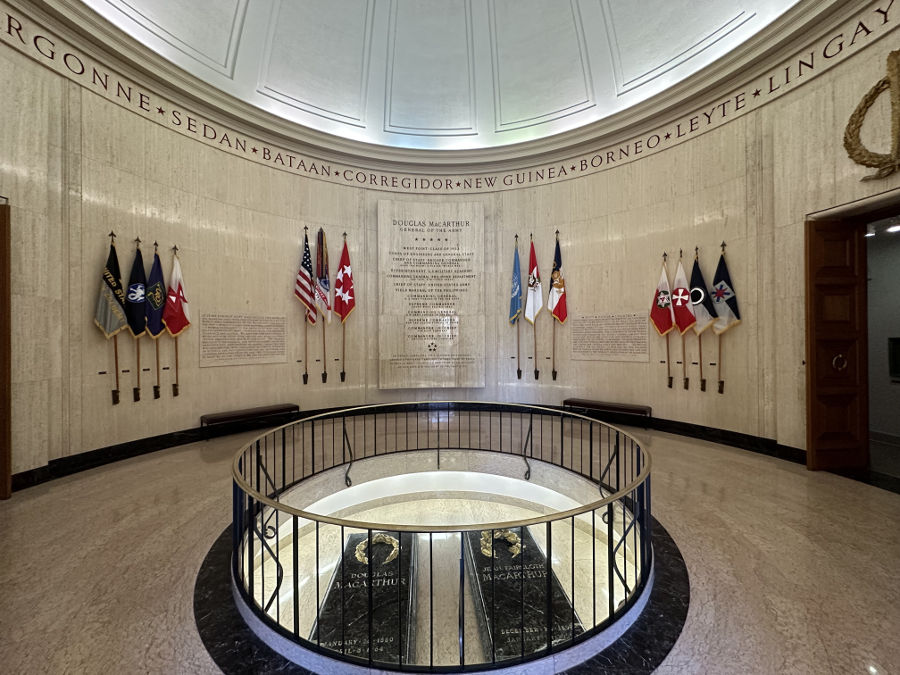
The tomb of General Douglas MacArthur and his wife Jean in the in the MacArthur Memorial in Norfolk City Hall. Source: Toohool BY-SA 4.0
Notes
- Roberts 2012, p. 384
- Mayer 1975
- Verhagen, F., "Huey Long: kampioen van de gewone man", Historisch Nieuwsblad, 3/2023, op: historischnieuwsblad.nl
- Roberts 2012, p. 387
- Hastings 2020, p. 269
- Mayer 1975
- Roberts 2012, p. 388
- Estimates vary from 5.500 to 18.500
- Hastings 2020, p. 273
- Beevor 2012, p. 392
- Hastings 2020, p. 309
- Beevor 2012, p. 683
- ibid. p. 683
- ibid. p. 694
- Mayer 1975
- TracesOfWar.nlTracesOfWar.nl
- Ehrenfreund 2013, p. 157-158
- Hastings 2018, p. 111
- ibid. p. 116-117
- ibid. p. 106
- ibid. p. 23
- ibid. p. 194-195
- ibid. p. 197
- ibid. p. 218
- ibid. p. 333
- ibid. p. 381
- Roberts 2012, p. 392
- ibid. p. 392
- Hastings 2018, p. 582
- 30 Roberts 2012, p. 383
- ibid. p. 393
- Hastings 2020, p. 499
- ibid. p. 273
- ibid. p. 648
- ibid. p. 749
- ibid. p. 117
- Roberts 2012, p. 393
Information
- Article by:
- Wesley Dankers
- Translated by:
- Arnold Palthe
- Published on:
- 19-01-2025
- Feedback?
- Send it!
Related sights
Related books
Sources
- BEEVOR, A., De Tweede Wereldoorlog, Ambo|Anthos, Amsterdam, 2012.
- EHRENFREUND, N., De erfenis van Neurenberg, Omniboek, Utrecht, 2013.
- HASTINGS, M., De geheime oorlog, Hollands Diep, Amsterdam, 2015.
- HASTINGS, M., De Koreaanse Oorlog, Hollands Diep, 2018.
- HASTINGS, M., Inferno, Hollands Diep, Amsterdam, 2020.
- MANCHESTER, W., American Caesar, Back Bay Books, 208.
- MAYER, S., De Japanse oorlogsmachine, Elsevier, Amsterdam, 1978.
- MAYER, S., MacArthur, Standaard Uitgeverij, Antwerpen, 1975.
- ROBERTS, A., Legendarische veldheren III, Omniboek, Utrecht, 2011.
- WEBB, J., De generaal van de keizer, Het Spectrum, Utrecht, 1999.
- Apocalypse La Guerre des Mondes 1945-1991, 2019
- Steen, P. van der, "Atoombommen op China", Historisch Nieuwsblad, nr. 2/2018
- Landin, M. & MØNSTER-KJÆR, E., "Douglas MacArthur: Militair genie leed zware nederlaag", Historia
- Vossen, K., "De comeback van MacArthur", Historisch Nieuwsblad, nr. 5/2021
- TO BUILD A HERO: DOUGLAS MACARTHUR AND THE WAR THAT WASN’T
- Thanks to Leo G. Lensen for final editing and selecting the images.
